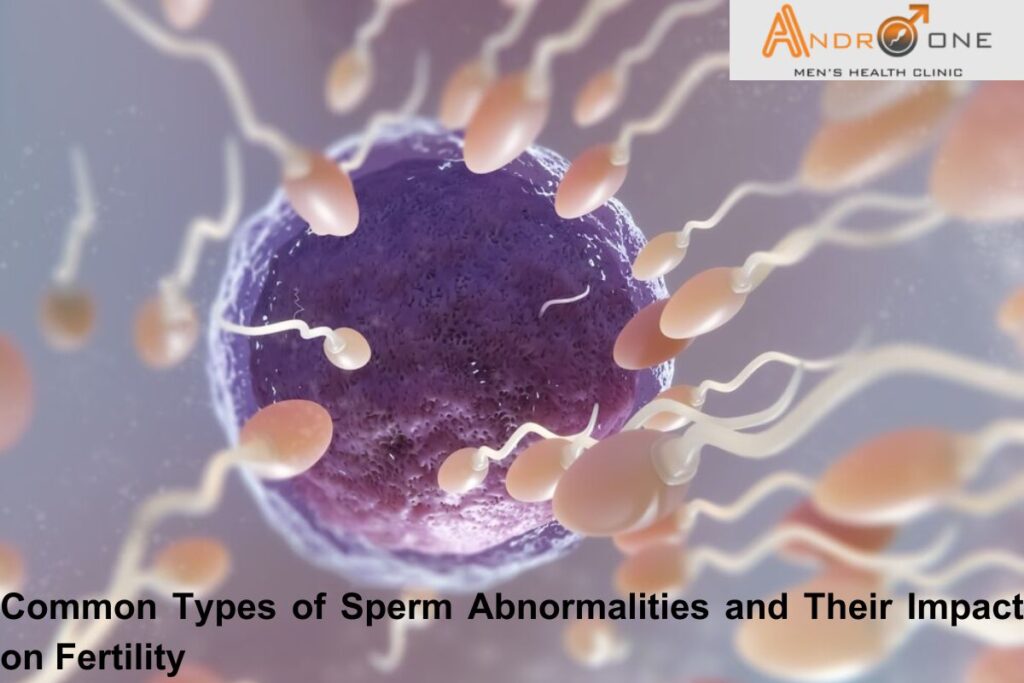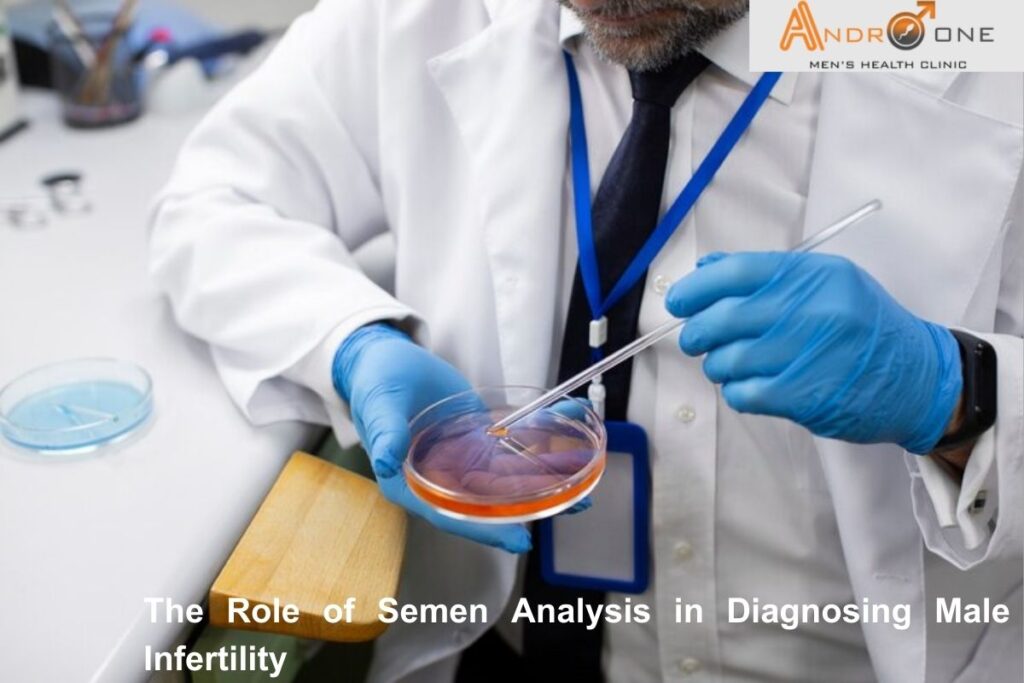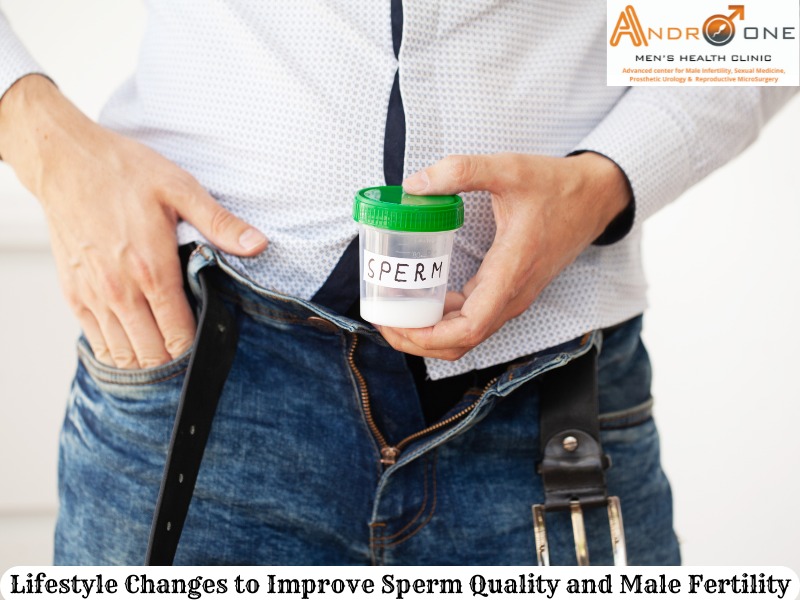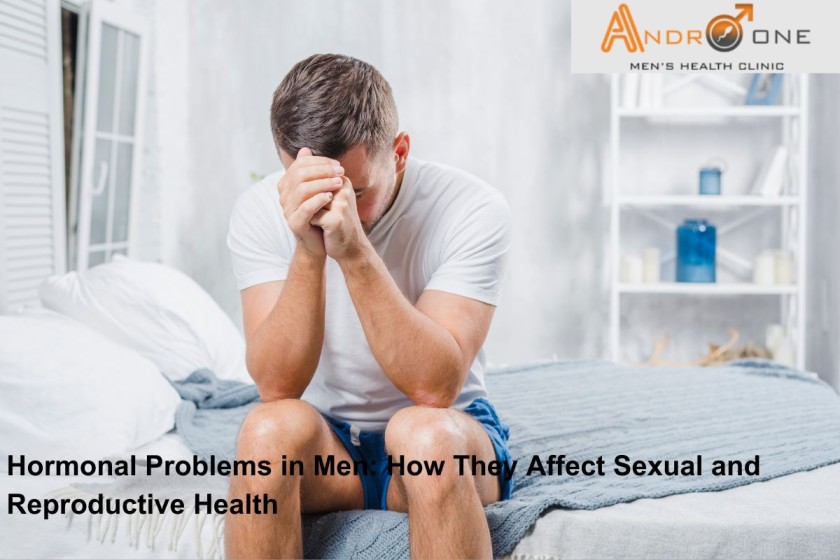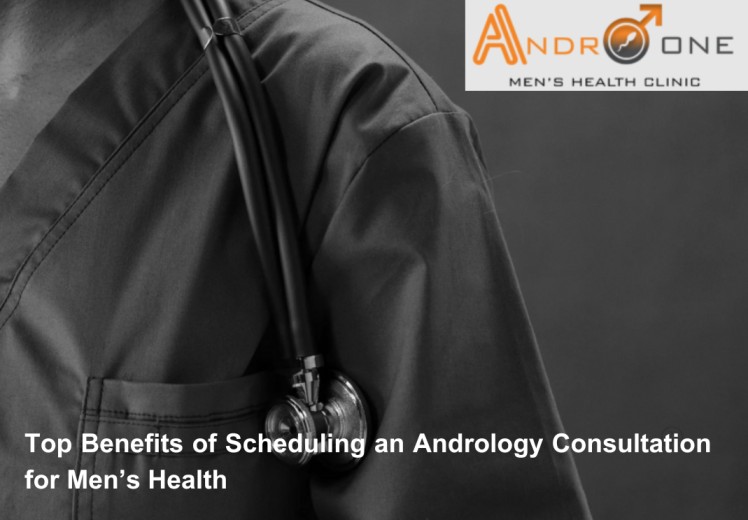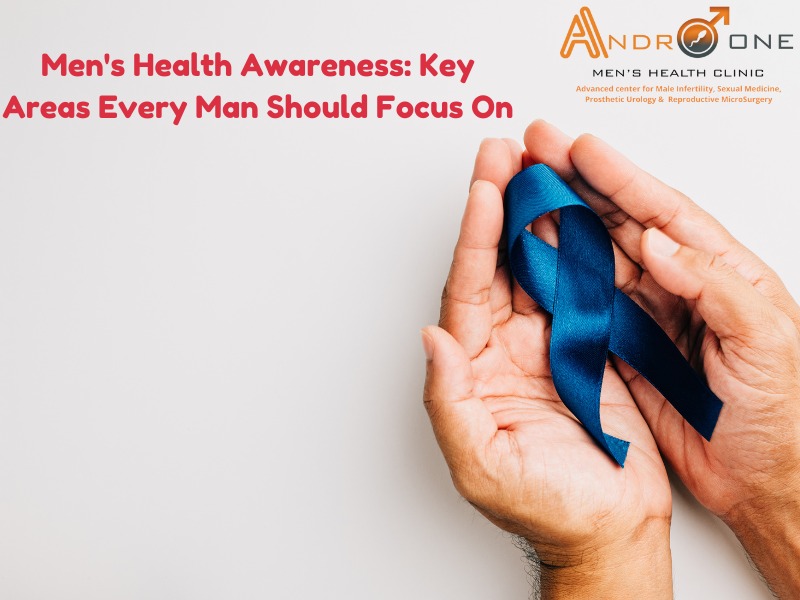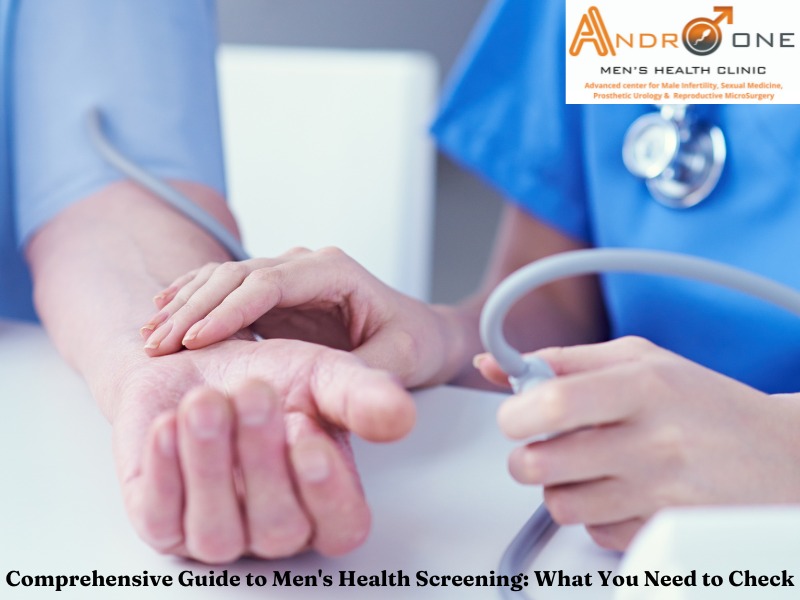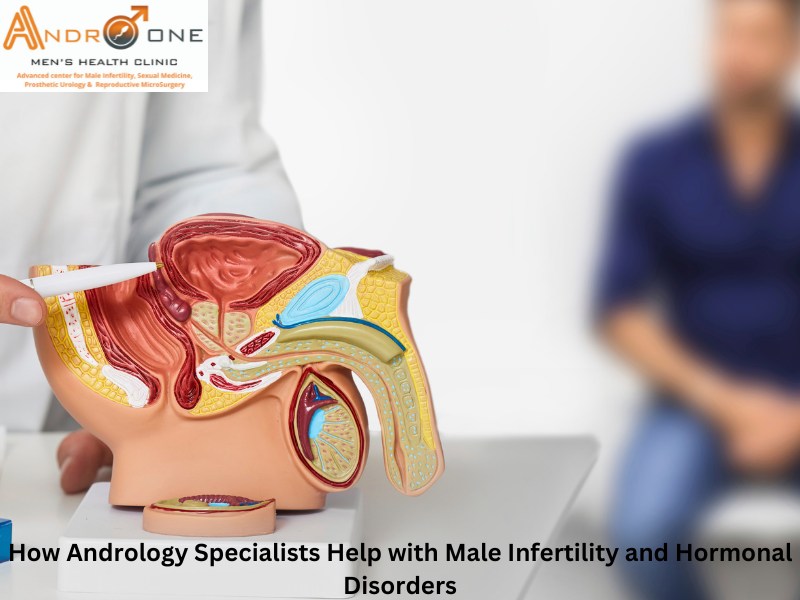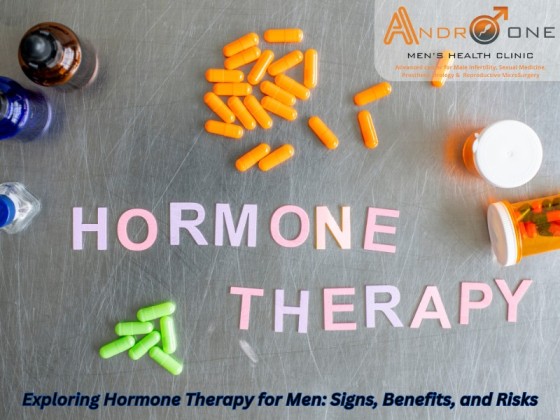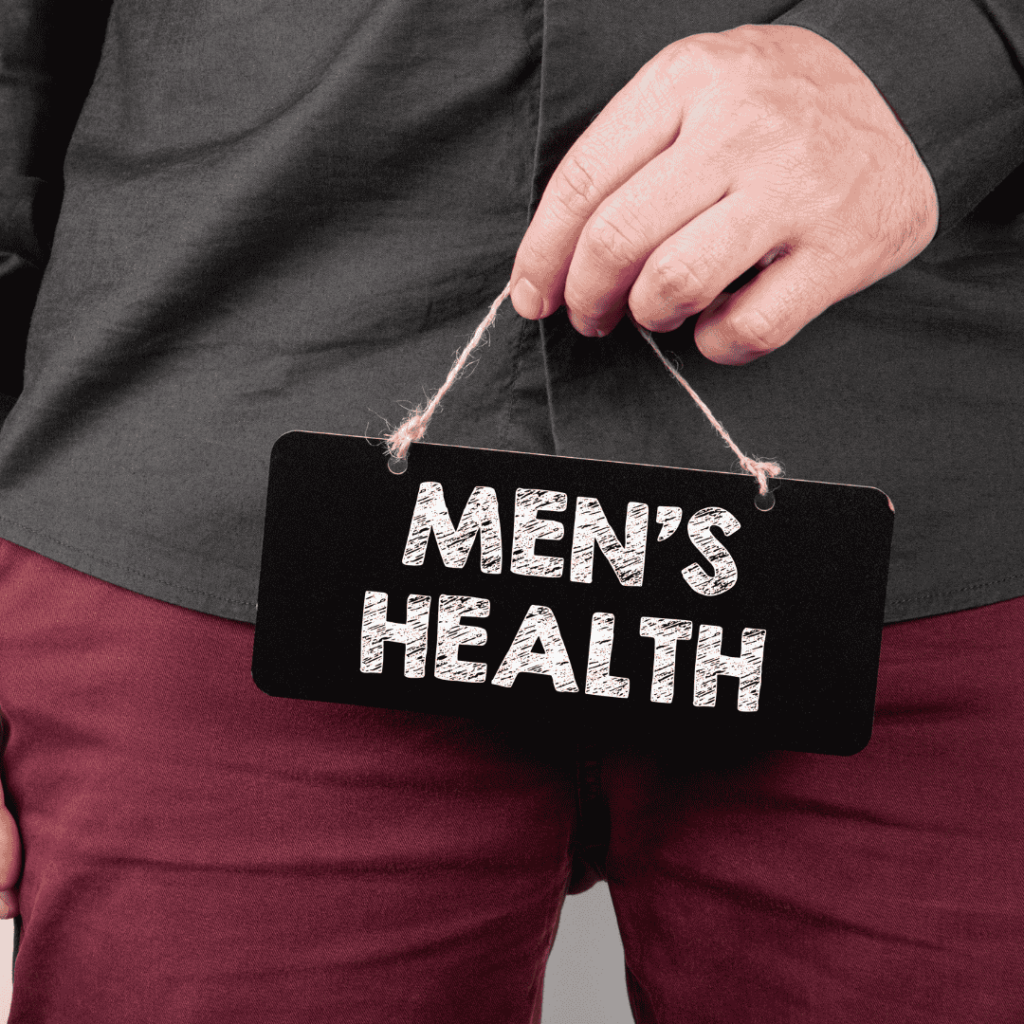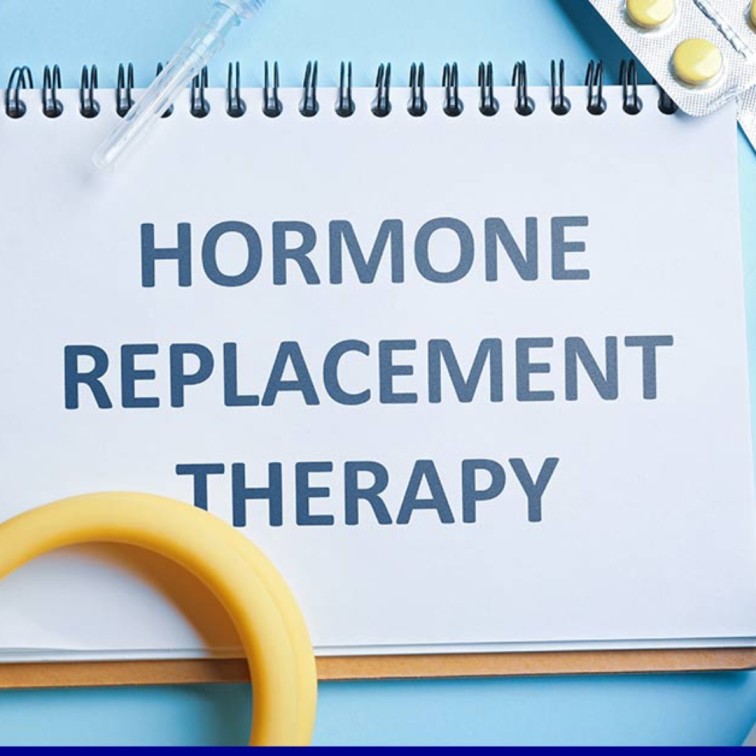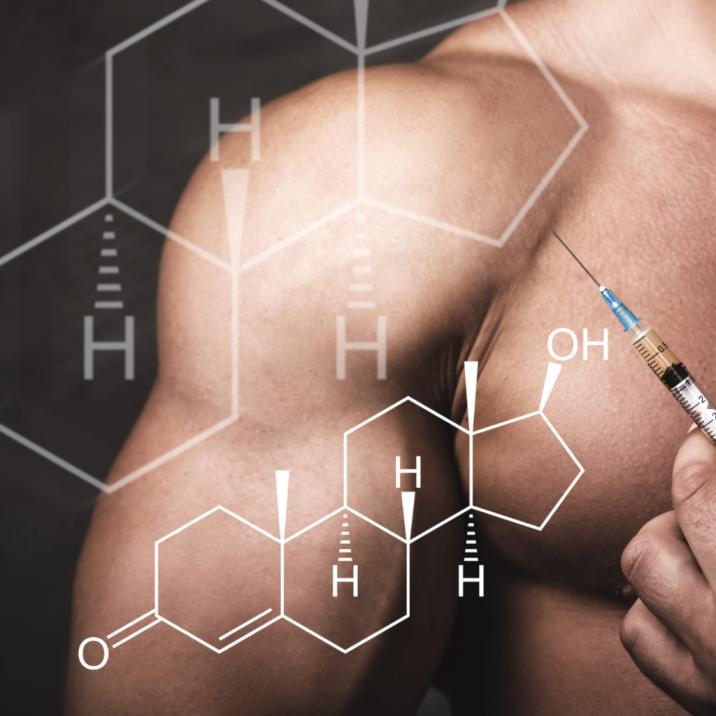Andrology
The Role of Semen Analysis in Diagnosing Male Infertility
Rising incidences of new infertility rates among men have brought up issues in the lives of many couples worldwide. For most couples trying to conceive, male infertility is one of the most challenging problems to deal with at that stage in their lives. Semen analysis is beneficial in determining male infertility. By this simple test, the sperm health condition is understood and can clarify other underlying issues that may affect fertility in a man. Learning how semen analysis works will inform men how to act toward treatment. What is Semen Analysis? Semen analysis is a laboratory investigation of the sperm quality from a man. It includes the assessment of factors such as sperm count, motility (movement), morphology (shape), and volume. It is done to check for all possible problems that can lead to poor conception success. A semen analysis can be used to infer about the man’s reproductive health as well. A complete semen analysis will typically involve: Sperm Count: The number of sperm in the semen sample. Motility: Movement capability of sperm for proper mobility. Morphology: The shape and size of sperm. Volume: The amount of semen produced. pH Level: The acidity or alkalinity of the semen. Why is Semen Analysis Important in Male Infertility Diagnosis? Semen analysis identifies the causes of male infertility. It shows what doctors are working with in determining the underlying issue. A semen analysis showing low sperm count, poor motility, or abnormal morphology can point toward male infertility. This test can also help exclude other conditions, such as infection or hormonal imbalance. Additionally, semen analysis can be considered the first step toward eventually identifying an effective treatment. If an abnormality is found, the physician may carry out additional tests to find the cause. Therefore, semen analysis is usually the first line of diagnosis for male infertility. Common Causes of Male Infertility Identified Through Semen Analysis Semen analysis can find various reasons infringing upon infertility. Some of the most common causes include: Low Sperm Count: Too few sperm in the semen make it very difficult to fertilize an egg. Poor Sperm Motility: If sperm doesn’t swim properly, it may not be able to reach the egg. Abnormal Sperm Morphology: Irregular sperm shape may hinder its ability to penetrate through the egg. Infections: Infections affecting the reproductive organs may lead to reduced sperm counts and motility. Varicocele: An abnormal dilatation of veins within the scrotum may affect sperm production. Finding the above problems through semen analysis allows doctors to recommend a proper course of action. How Semen Analysis Helps in Treatment Decisions? When semen analysis results are returned to the physicians, docdoes tors recommend Helpecessary treatment. In the case of low sperm counts, lifestyle changes or medication are usually prescribed, while problems with motility may require sperm retrieval techniques or assisted reproductive technology. However, semen analysis may also serve as a means by which doctors would monitor efficacy or effectiveness of treatments. Improvement in sperm quality gives an increased probability of successful conception following treatment. This test may offer an excellent feedback opportunity under which the doctor may modify the treatment plan. Help from Experts If you are having trouble conceiving, see an expert. The best andrologist in Salem or the best sexologist in Namakkal would be good at rendering professional assistance. This area includes experts dealing with male reproductive health diagnosis and treatment of infertility problems. Such individuals combine expertise with the latest technology in the field to solve fertility problems. A sexual Medicine Expert in Tamilnadu would benefit you too. They can offer treatments for most underlying conditions like erectile dysfunction, low testosterone, and other sexual health problems. Consulting with these professionals ensures personalized care for your most specific needs. Conclusion Semen analysis is one of the major tools for diagnosing male infertility. Thereby providing vital information into the possible causes of infertility. The assessment of sperm count, motility, along with morphology also serves as a guide in treatment. Therefore, when faced with a case of infertility, seeking the help of a qualified professional is the ideal method to proceed. Those experts in Andrology and Men’s Health in Tamilnadu can then give you the right support and treatment plans according to your needs. Remember, early diagnosis and intervention usually go a long way in improving a couple’s chances of becoming pregnant. So, don’t hesitate to get a semen analysis done if you’re experiencing fertility problems. That first step towards understanding your reproductive health could well be the answer you’re waiting for.
How to Manage Female Orgasmic Disorders: Tips and Treatments
Female orgasmic disorder represents a condition that affects many women. The condition revolves around difficulty or an inability to reach orgasm during sexual activity. The problem often generates both stress and emotional as well as physical distress. Fortunately, several ways can effectively be used to manage and even treat this disorder. In this blog, we are going to discuss tips as well as treatments for female orgasmic disorders. Understanding Female Orgasmic Disorder Female orgasmic disorder may be due to various causes. It could be associated with physical causes, psychological problems, or relationship issues. Most women have a problem attaining orgasm, even when sexually stimulated appropriately. This condition is accompanied by stress, anxiety, and reduced quality of life. However, to begin with, a proper treatment has to be understood based on the root cause. In most cases, relief is provided by a combination of therapies. Therefore, it is imperative to seek professional help from a sexual health expert in addressing such concerns. Tips to Manage Female Orgasmic Disorder There are various ways of managing female orgasmic disorder. Some of the tips that can help in improving sexual satisfaction are discussed below: Communication with Your Partner Open communication is important between the couple. This will enable discussion of desires, preferences, and concerns for increased intimacy. The sexual expectations discussed may make an environment more comfortable, thus decreasing anxiety and enhancing the chances of orgasm. Relaxation and Stress Management Stress and anxiety are known to inhibit sexual pleasure. Techniques such as yoga, deep breathing, and meditation can be used to handle stress. Relaxation of the mind is an important factor for achieving orgasm, so take time out to relax before intimate moments. Try Different Sexual Positions Sometimes, a sexual position change will make all the difference. Angles and techniques will stimulate arousal to a point that will more than likely give an orgasm. Increased foreplay will also stimulate the arousal of one’s sex. Masturbation for Self-Discovery Masturbation gives women the ability to explore their bodies and find out what they like. Such self-exploration can enable them to figure out what stimulation type leads to orgasm. Besides, it makes it easier to be more confident and more likely to share preferences with a partner. Medical Treatments for Female Orgasmic Disorder If lifestyle changes and communication are not improving the situation, then medical treatment may be prescribed. Among the available treatments are: Sex Therapy With sex therapy, a trained therapist can help aid in the resolution of psychological factors that affect sexual function. Cognitive-behavioral therapy is the most used treatment for female orgasmic disorder. It helps women overcome negative thoughts and beliefs about sex so that they can improve their sexual health. Hormonal Therapy Female orgasmic disorder may be caused by hormonal imbalances. In this condition, hormone replacement therapy (HRT) may be prescribed. This treatment balances the hormones in the body and, therefore, sexual response. Medications Certain pharmacologic treatments can help patients manage female orgasmic disorders. A few of them increase the blood flow to the genital organs, increasing sexual pleasure. However, medications should be strictly prescribed and followed by a healthcare provider, especially a sexual medicine expert from Tamilnadu. Pelvic Floor Exercises Pelvic floor exercises, like Kegels, strengthen the muscles responsible for orgasm. These are very useful in increasing sensitivity and sexual function improvement. Consistent exercise routines can help improve sexual satisfaction quite dramatically. Seeking Professional Help If the condition of female orgasmic disorder becomes unmanageable, it is essential to consult a professional. The best sexologist in Salem can help and guide one through the appropriate actions. Besides this, a visit to an andrologist in Tamilnadu will eliminate any kind of medical issues behind the condition. A Sexual Health Information clinic in Tamilnadu would be able to give more insight into the treatment and management of this condition. Moreover, a visit to the best andrologist in Namakkal may help identify physical issues such as hormonal imbalances or pelvic health problems. Conclusion Self-care, communication, and professional help aid the management of female orgasmic disorder. It helps women improve their sexual health and enjoy more closeness with each other. However, it is relevant that for this reason, women should seek professional help from a sexual medicine expert in Tamilnadu to design a treatment plan. With the right attitude, female orgasmic disorder might be overcome; a fulfilling life can be found in sexual functions. Don’t hesitate to investigate various treatments or strategies to try and improve your well-being.
Common Vulva and Vaginal Skin Issues: Causes and Treatments
Problems involving vulva and vaginal skin are so painful and anxiety-provoking. Such disorders are common to women of any age. Therefore, It is important to understand what causes them and how they may be treated effectively. In this article, we shall discuss some of the most common vulva and vaginal skin disorders, their causes, and possible treatments. 1. Vaginal Itching and Irritation It is a very common problem that causes itching in the vaginal area, and it may irritate. The pain is usually due to infections, allergies, or dryness. A yeast infection mostly causes itching. It causes redness and swelling in the region around the vagina. Irritation might also be caused by an allergic reaction to soaps, detergents, or perfumes. Treatment: Treatment for itching is cause-dependent. In the case of fungal infections, creams are used. Fragrances may cause allergies and thus can be avoided. Moisturizers help to reduce dryness in the vagina. If irritation persists, then one must seek the best Andrologist in Salem or a Sexual Medicine Expert in Tamilnadu for proper diagnosis and treatment. 2. Vaginal Dryness The reason behind vaginal dryness is that the tissues of the vagina do not secrete enough moisture. It often accompanies hormonal changes, particularly in women going through menopause. Other reasons for this are stress, medication, and dehydration. Dryness may cause pain during sexual activities and might contribute to infection. Treatment: It may be possible to use water-based lubricants to make sex less painful. Hormonal therapy could be advised through creams containing estrogen for postmenopausal women. However, drinking enough water and preventing chemicals that cause severe dryness in the vaginal area keep the vaginal area moist. 3. Vaginal Infections Another common concern is vaginal infections. The most frequent types of vaginal infections are bacterial vaginosis and yeast infections. BV is the condition of having an imbalance of the normal bacteria in the vagina. Yeast infection occurs when the Candida fungus grows back. There is itching, unusual discharge, and a strong odour in both infections. Treatment: Most patients with bacterial vaginosis are treated with antibiotics. For yeast infections, antifungal creams or oral medicines are administered. Additionally, good hygiene and avoiding tight clothing help in preventing infections. In case the infections are recurrent, a visit to the Best Sexologist in Namakkal would help in diagnosing the problem and further prevent the problems. 4. Vulvar Lichen Sclerosus Vulvar lichen sclerosis is a disease that sometimes causes white patches over the vulva. It may lead to itching, pain, and scarring, and it is more common in postmenopausal women but can appear at any age. The disease also seems to be some type of immune system dysfunction. Treatment: In this condition, the most commonly used medication is topical corticosteroids. For worse conditions, additional medications can be prescribed. However, to monitor the progression of the disease properly, a proper follow-up visit with the doctor is important. 5. Vulvar Dermatitis Vulvar dermatitis is inflammation of the skin around the vulva. It mostly results from irritants, like soaps, lotions, or tight clothing. Some people have allergies to specific fabrics or chemicals that cause this condition. They experience redness, itching, and swelling. Treatment: This is usually to steer clear of irritants and use soothing creams. In some, a topical steroid may be ordered to minimize the inflammation. However, if this does not correct the issue, a consultation with an expert Sexual Medicine Specialist in Tamilnadu may prove beneficial in discovering the best avenues for treatment. 6. Genital Warts Genital warts are caused by the human papillomavirus, which is a sexually transmitted infection that is very common. They look like small, flesh-coloured bumps in the genital area. Although genital warts are not harmful, they can be uncomfortable and may spread if left untreated. Treatment: Topical drugs, cryotherapy, and laser therapy are applied in the treatment of genital warts. Therefore, the patient should visit a healthcare provider to receive the right treatment since this will prevent the spread of the virus. Some vaccines can be used to prevent some strains of HPV that may reduce the occurrence of genital warts. 7. Pubic Lice Pubic lice are sometimes referred to as crabs; it is a small insect infesting pubic hair. These can cause itchiness and irritation. Pubic lice can be spread through sexual contact or the use of towels or bed sheets. Treatment: Medicated shampoos available over the counter can treat pubic lice. In this case, one must ensure the clothes, bed cover, and towel are all cleaned in hot water to not let them return to your body again. Seek an appointment with the Best Sexologist in Namakkal for critical times to obtain a better doctor’s advice on such situations. 8. Vaginal Discharge Changes Changes in the consistency of vaginal discharge may indicate the presence of some underlying condition. Normal vaginal fluid is either transparent or whitish and not very smelly. When these characteristics change colour or texture, this may suggest some infection or some other medical problem. Treatment: If you notice a peculiar discharge, you have to visit the doctor. It will depend on what caused the discharge, either infection or other health issues. They might put on some antibiotics or antifungal medication or maybe even other therapy for treatment. Prevention Tips Proper care will prevent vulva and vaginal skin problems. Here are some useful tips for preventing the said problem. Conclusion Vulva and vaginal skin problems are very common, but they can often be treated quite effectively. It is very important to identify the cause in order to determine the best treatment. Furthermore, if you are facing persistent or severe symptoms, then you can approach a healthcare provider like the Best Andrologist in Salem or a Sexual Medicine Expert in Tamilnadu for the right solution. Taking preventive steps and maintaining good hygiene will keep these issues at bay.
Lifestyle Changes to Improve Sperm Quality and Male Fertility
Male fertility is a very important part of reproductive health. A healthy lifestyle can greatly improve sperm quality. Many men suffer from infertility, but simple lifestyle changes can improve sperm health. This blog will discuss lifestyle changes that can enhance male fertility and sperm quality. Maintain a Healthy Diet A well-balanced diet really helps in raising the quality of sperm. Nutrient food intake increases sperm and mobility. Foods which are rich in antioxidants, including fruits and vegetables, protect them from damage caused by free radicals. Vitamins such as Vitamin C, Vitamin E, and Zinc are very good for the healthy production of sperm. Including an adequate amount of omega-3 fatty acids improves the motility of sperm. Exercise regularly Physical activity is very essential for improving general health, which includes fertility. Moderate exercise boosts testosterone levels and improves sperm quality. Actually, extreme exercise or intense workouts may block this. However, aim to get a minimum of 30 minutes of moderate exercise most days of the week, which will enhance circulation and relieve stress-good things for sperm. Avoid Smoking and Excessive Alcohol Smoking and excessive drinking can lower sperm quality. Smoking introduces toxins to the sperm’s DNA, thus making them less fertile. Alcohol lowers testosterone levels if taken in excess and reduces the production of sperm. Therefore, quitting smoking and reducing alcohol is essential for good sperm. Reduce Stress Levels Chronic stress can affect sperm health negatively. Stress elevates the levels of cortisol, which may interfere with hormone production, affecting sperm count. Therefore, managing stress through relaxation techniques is essential. Meditation, deep breathing exercises, or yoga can help reduce stress and improve overall well-being. By lowering stress, you improve your chances of enhancing sperm quality. Get Enough Sleep Proper sleep is an essential requirement to maintain hormonal balance. Sleep deficiency may lead to a reduction in testosterone production, which is responsible for sperm health. Therefore, ensure that you get 7-8 hours of quality sleep at night. A well-rested body has healthier sperm and better fertility outcomes. Maintain a Healthy Weight Obesity and overweight contribute to the issues with sperm quality. Body fats have a possibility of hormonal imbalances, where there is either reduced sperm count or motility. However, a normal weight is also attained through correct diet and body exercises, maintaining hormone regulation in the body, moreover enhancing the production of sperm and fertility rate. Limit Exposure to Environmental Toxins Environmental toxins can harm the health of sperm. Toxic chemicals such as pesticides, heavy metals, and air pollutants can cause damage to the DNA of the sperm. Reduce exposure to environmental toxins as much as possible. Wear protective gear while handling chemicals. Additionally, avoid exposure to high levels of pollution. Try to use natural products for skincare and household cleaning that contain fewer chemicals. Avoid Wearing Tight-Fitting Clothes Tight clothing like skinny jeans or briefs causes an increase in scrotal temperature. Sperm production and motility get damaged due to high temperatures. Furthermore, try loose-fitting clothes, particularly underwear. This will help maintain the testicles at a cool temperature, enhancing sperm health and fertility. Stay Hydrated Proper hydration is very important for overall health, including sperm production. Dehydration can cause thickened semen, which may affect sperm motility. Therefore, drinking enough water throughout the day is very important. Try to drink at least 8 glasses of water a day to keep your body and sperm healthy. Seek Professional Guidance If lifestyle changes do not bring about improvement, medical consultation is essential. An expert may identify underlying health issues. Moreover, personalized advice can be sought from the Best Andrologist in Namakkal and the Best Sexologist in Salem. Furthermore, these experts will prescribe treatments along with other solutions that can help impregnate a woman by improving fertility along with spermatogenesis. Experts in andrology and men’s health in Tamilnadu will stand by your needs while ensuring proper care. Conclusion Improving sperm quality and male fertility will require a lot of commitment towards healthy lifestyle changes. A balanced diet, regular exercise, proper sleep, and stress management are essential. Avoiding bad habits such as smoking and excessive alcohol intake will also help improve fertility. Making these lifestyle adjustments will make you much more likely to conceive. However, if the problems persist, there is help from specialists, like the Men’s Sexual Health Clinic in Tamilnadu. With the right guides and determination, you will find yourself taking control of your fertility health.
Hormonal Problems in Men: How They Affect Sexual and Reproductive Health
Hormones are very important to the body. They regulate many aspects of the body, including sexual and reproductive health. However, hormonal imbalance among men can cause many disorders. These disorders may ruin a man’s quality of life. Let’s learn about how hormonal problems impact the sexual and reproductive health of men. Understanding Hormones in Men Men have several key hormones that regulate body functions. The main hormone responsible for sexual health is testosterone. It supports the production of sperm, sex drive, and growth of muscles. Other hormones like estrogen and prolactin also are important for balance. An imbalance in these hormones leads to problems. Common Hormonal Issues in Men Most hormonal issues affect men’s health, such as low testosterone levels in males. The condition may lead to decreased sexual desire, fatigue, and depression. Additionally, low testosterone levels cause erectile dysfunction. In some cases, it also leads to infertility in men. Another hormonal imbalance is that of prolactin, a hormone that promotes milk production. Too much prolactin in men can cause low sexual drive and erectile dysfunction. However, it may also cause a condition referred to as gynecomastia where men start developing breast tissue over their chest. Furthermore, the imbalance of the thyroid is another factor. Both hyperthyroidism and hypothyroidism might cause sexual malfunction because hyperthyroidism results in low sperm counts, but hypothyroidism erectile dysfunction is caused by these two conditions. Impact on Sexual Health Hormonal issues significantly contribute to sexual health. The number one cause of erectile dysfunction is due to low testosterone, especially since testosterone is the factor that helps keep the blood circulating within the penis. Without this, erection cannot occur. Low testosterone can also lead to a decrease in libido. Moreover, men may lose interest in sex or have fewer spontaneous erections. As a result, relationships can suffer, and men may feel stressed or anxious. The second is infertility. Hormonal imbalance lowers sperm count or even changes the quality of sperm, thus making it harder for a man to father a child. Hence, any man who finds difficulty conceiving should consult an expert on hormone-related issues. Effect on Reproductive Health Hormonal problems also contribute to male infertility. For example, low levels of testosterone may impair sperm count, making conceiving difficult. Therefore, excessive prolactin can compromise sperm production. Men with hypothyroidism may experience low sperm motility, hence decreasing the chance of fertilization. Other conditions being treated through hormone therapy may also affect a person’s fertility. However, some treatments for other diseases like cancer can lower the testosterone level, thus affecting reproductive health. Seeking Help from Experts If a man finds signs of hormonal imbalance, he should be taken to the best possible medical practitioner. There is a specific doctor who can take care of male reproductive issues, and they are called andrologists. The best Andrologist in Salem or an Andrologist in Tamilnadu can make investigations to detect the hormonal disorder. Although, they recommend the treatment plan according to the outcome of the tests. Visit the best sexologist in Namakkal, who can also help to address sexual health issues. A sexologist is educated in managing hormonal imbalance-induced sexual dysfunctions. They may advise patients on how to better control symptoms and improve sexual health. Moreover, consultation with Experts in Andrology and Mens Health in Tamilnadu would be necessary for proper care. These specialists are specifically dealing with male reproductive and sexual health. They know the intricacies of hormonal imbalance and offer good treatments. Treatment Options for Hormonal Imbalances There are several treatment alternatives for hormonal issues in men. Commonly used for low testosterone replacement therapy is testosterone replacement therapy. Such can be administered through injections, gels, or patches. Sexual function, libido, and energy levels may improve with testosterone replacement. For males with elevated prolactin, treatment might include the use of bromocriptine or cabergoline, which help decrease prolactin levels. Additionally, treatment for thyroid imbalance is often hormone replacement therapy to re-establish normal thyroid function, improving health in general. Sometimes, lifestyle modification might help. Regular exercise, a healthy diet, and managing stress might promote the balancing of hormones. Furthermore, not consuming alcohol and not smoking would contribute to a healthy level of hormones. Conclusion Hormonal problems can seriously affect male sexual and reproductive health. An imbalance in these hormones might result in sexual dysfunction or even infertility, among many other health conditions. For these reasons, it’s of utmost importance to understand the symptoms of hormonal problems as soon as possible. Seeking specialists like an UroAndrologist or sexologist for a correct treatment will be able to help a great deal. Therefore, if symptoms such as low libido, erectile dysfunction, or infertility are noticed, men should consult a professional. With proper treatment and lifestyle changes, hormonal balance can be restored and health improved. If you are seeking expert help, a visit to a Men’s Sexual Health Clinic in Tamilnadu may be the first step towards better health.
Penile Prosthesis: A Permanent Solution for Erectile Dysfunction
Erectile dysfunction, more commonly known as ED, is a very prevalent issue among men worldwide. This not only affects self-esteem but also impacts sexual intimacy and overall quality of life. There are numerous treatments available for erectile dysfunction; however, penile prosthetics is one of those methods that signifies a real cure. In this blog, we discuss the benefits of penile prosthetics, types, and penile prosthesis, with insights from leading experts. Understanding Penile Prosthesis for ED A penile prosthesis is a surgically placed device inside the penis. This enables a man to achieve an erection suitable for sexual intercourse. Unlike other temporary treatments, this becomes a permanent remedy for ED. This is especially useful for men who are non-respondent to medications or other treatments. Why Choose Penile Prosthesis? The selection of a penile prosthesis significantly increases sexual satisfaction and confidence. Sexual function is restored, and sexual experiences are reliable and natural. The couple can pursue sex activities without planning and interruptive measures. Therefore, a penile prosthesis can restore joy in relationships. Types of Penile Prosthesis There are two main types of penile prosthesis: inflatable and malleable. Both types have unique benefits: Inflatable Prosthesis The inflatable device is made up of cylinders, a reservoir, and a pump. The pump located in the scrotum permits the user to inflate and deflate the device. This kind of prosthesis offers a realistic appearance and sensation. Moreover, it can be concealed when not in use. Malleable Prosthesis The malleable prosthesis is made up of a pair of rods placed inside the penis. It remains partially rigid so that the person can manually adjust it. This is easier to use but less discreet. In any case, it is popular for those requiring a very minimal solution. The Implantation Procedure The placement of a penile prosthesis is one of the simplest surgical procedures. It is performed in either general or spinal anaesthesia by an expert andrologist. Therefore, the surgeon makes a small incision and passes it into the chosen device. Recovery time is short, and men may return to normal activities within four to six weeks. The surgery takes an hour or two to complete on average. Benefits of Penile Prosthesis The penile prosthesis has numerous benefits, making it an attractive option for ED patients: Permanent Solution Unlike medication, it is a one-time solution to lifetime use. It is most appropriate for men who have been unresponsive to pills or injections. Improved Intimacy It allows spontaneous sexual activity without pre-planning. Hence, it takes back the joy of natural intimacy. High Satisfaction Rate Men with penile prosthesis are satisfied in high numbers. Their sexual partners also enjoy improved closeness and intimacy. Low Maintenance It has a long life, and only basic maintenance once implanted. Are There Any Risks? Although penile prosthesis are generally safe, they are associated with some risks. These include infection, mechanical failure, or malfunction of the device. However, the modern version is more durable and reliable. Additionally, consulting an experienced surgeon reduces these risks. It is essential to discuss your concerns with a qualified professional. Who Should Consider a Penile Prosthesis? A penile prosthesis is appropriate for men who have tried other treatments without success. These include men unresponsive to ED medications or injections. Additionally, men with some specific medical conditions, such as diabetes, find this option beneficial. A consultant UroAndrologist in Tamilnadu can provide help in making the right choice. Preparing for the Procedure Before the surgery, you are advised to see a specialist who would discuss your medical history. The best andrologist in Salem will be able to analyse your needs and decide the best type of prosthesis for you. This way, the result would be the best. Furthermore, your doctor may also advise some tests to confirm whether or not the treatment can be carried out. What to Expect After Surgery? Then, you will need a period of post-operative recovery. Most men feel uncomfortable for a few days, but discomfort decreases after about one week. Your physician will make recommendations for self-care and follow-up visits. Moreover, you will also want to avoid sexual activity until fully healed, which should be approximately six weeks. Cost of Penile Prosthesis The cost of the penile prosthesis surgery depends on various factors. These include the type of device, hospital charges, and location. Consulting the best sexologist in Namakkal can provide more clarity on the pricing. However, it is worth noting that many men find it a valuable investment. Choosing the Right Specialist A good specialist is required to get the procedure done well. One can approach experts in Andrology and Men’s Health in Tamilnadu who will provide expert guidance and ensure that the procedure is performed safely. A good surgeon understands their patients and provides proper care. This is why selecting a good specialist improves the success rate of the procedure. Conclusion Penile prosthetic reconstruction is one of the most definitive interventions to handle male erectile dysfunction. It is applied for men who need a one-time procedure, bringing benefits throughout life. It even enables the restoration of confidence, intimacy, and quality of life. Find an experienced andrologist who will help you pass the nice process with satisfactory results. If you are considering this option, speak to an expert to make an informed choice.
Advanced Semen Analysis: What Does it Reveal About Your Fertility?
Semen analysis forms a significant part of studying male fertility. It observes the various aspects of health in sperm to diagnose any kind of fertility issues. More and more men in Tamil Nadu are now opting for advanced semen analysis. This is mainly because semen analysis can estimate fertility and provide more understanding of reproductive health. What is Advanced Semen Analysis? Advanced semen analysis looks beyond the basic sperm counts. It examines many detailed factors of sperm health. For example, it assesses the motility or the swimming ability of the sperm. Therefore, the sperm morphology is also evaluated, which describes the shape of the sperm cells. All these contribute to male fertility. Furthermore, it is also the type of analysis that is often recommended for men with fertility issues. When you have been trying to conceive and failing, an advanced semen analysis can prove useful. Results will guide the specialists in formulating a treatment plan. Why is Semen Analysis Important? Most fertility problems are related to the male. However, basic semen analysis does not give a complete report. In this regard, advanced semen analysis offers more sophisticated investigations of the sperm’s condition. Advanced semen analysis allows experts to detect underlying reasons that may not be diagnosed by other tests. Sometimes, they are masked by other outcomes or may appear in simple tests. Additionally, the results often indicate what is required to be focused upon. Key Factors in Advanced Semen Analysis Advanced semen analysis evaluates the following critical sperm characteristics of a male: Sperm Motility: This defines the movement of sperm. Sperms need to be able to move well for them to reach the egg. Poor motility brings down the chances of getting fertilised. Sperm Morphology: Morphology is an examination of the shape of the sperm cells. Aberration of the shape of sperms may cause them difficulties in fertilising. Sperm Count: This measures the total sperm in a sample. A low count may indicate fertility problems. DNA Fragmentation: DNA health is a key factor in fertility. It is used to check for breaks within the sperm’s DNA. High fragmentation will negatively impact embryo development. How Does Advanced Semen Analysis Benefit Fertility Treatment? Advanced semen analysis is a great benefit for fertility treatments. With the specifics of sperm health, one can focus on the treatment. Hence, fertility specialists can advise on treatments that target the problem. Additionally, in case the DNA fragmentation is high, some treatments can be helpful. For example, antioxidants improve the quality of sperm DNA. Another aspect of advanced analysis is to know whether lifestyle changes can help improve fertility. When to Consider Advanced Semen Analysis? Not every man needs such an advanced semen analysis. However, it is helpful to men who experience unexplained infertility. For example, if you have been failing to conceive for more than a year, you will consider advanced analysis. Advanced semen analysis is also helpful if you have lifestyle risk factors. For example, smoking, consuming too much alcohol, or experiencing extreme stress may interfere with one’s fertility. Therefore, Advanced analysis can produce results in issues related to these habits. There are many clinics available in Tamil Nadu if you wish to visit a specialist. The Men’s Sexual Health Clinic in Tamil Nadu and others offer super analysis. Such clinics give detailed assessments and guide you through treatment. Consulting a Fertility Specialist in Tamil Nadu Fertility consultation services are also available from professional experts in Tamil Nadu. You might need to consult the Best Andrologist in Namakkal for advice. The treatment course is confirmed with a proper diagnosis only when you consult a professional expert. Furthermore, the advanced semen analysis results must be interpreted by professionals. Thus, consultation with a Consultant uroandrologist in Tamilnadu can clear all your doubts. An experienced doctor can explain the difficult term and can direct a patient to proper treatment. In Salem, you can even approach the Best Sexologist in Salem. Fertility clinics here are focused entirely on giving sexual health guidance in detail. Additionally, clinics such as the Sexual Health Information Clinic in Tamilnadu give you the right type of information about the various treatments. What to Expect During Advanced Semen Analysis? Most of the time, it’s a very simple procedure and would require only a collection of semen samples. This sample would be then taken to a lab by specialists for testing. Therefore, guidelines by the clinic must be observed. Avoid ejaculation for a few days before the test. In this way, the results will be valid. There may also be some medication or alcohol that you must avoid before the test is done. Once the test has been conducted, your physician will present the findings to you. If treatment is needed, they will inform you. Improving Fertility: Steps You Can Take Improving fertility typically demands lifestyle change. Therefore, begin healthy practices. For example, the overall health benefit of exercise is also going to aid with fertility. Stop smoking and limit alcohol. The two harmful practices have been shown to damage sperm. Moreover, take a healthy diet containing fruits, vegetables, and whole grains. Nutrient foods will improve the production of sperm as well as strengthen the overall reproductive system. However, stress management is very essential for fertility. Hormone balance is affected in stressful situations, which affects the quality of sperm. Such methods include meditation, deep breathing, and maintaining proper sleep, which would decrease stress levels. Conclusion Advanced semen analysis can provide insight into sperm health better. Hence, the specialists have an individualised fertility treatment approach. In case of infertility issues, you may get a Consultant UroAndrologist from Tamil Nadu. Expert consultation, lifestyle changes, and guidance by clinics like the Men’s Sexual Health Clinic in Tamilnadu will work well in treating reproductive health and increasing the fertility quotient.
Top Signs of Problems in the Male Reproductive System
The male reproductive system plays an important role in health. A single problem in this system can make a complete man’s life unmanageable. Early notices of warning signs and help can do just right. In today’s blog, we will give all these major signs of male reproductive disorders. Moreover, we will let you know when to see the specialist. Here are the top signs of problems in the Male Reproductive System Difficulty Achieving or Maintaining an Erection Erectile dysfunction is the most common indicator of reproductive disorder. While many males at times will have trouble erection, the underlying disease may be indicated by recurring issues that can be related to blood flow, hormones, or psychopathy. Therefore, recurrent erectile dysfunction must be explained by visiting a doctor. Changes in Libido One other danger sign is a sudden fall in sexual urge. It could be due to hormonal imbalances, stress, or problems in the relationship. However, some medical conditions, like diabetes, can play with your libido. Notice such changes, and see a professional. Men’s Sexual Health Clinic in Tamilnadu provides services for diagnostic issues of this kind. Pain in the Testicles Pain or tenderness in the testicle is serious. It can result from injury, infection, or even cancer. Additionally, testicular pain should not be ignored. It is advisable to seek medical attention when the pain is severe and persistent. In that case, one can always consult a Consultant uro andrologist in Tamilnadu for quality care. Unusual Lumps or Swelling Swellings or lumps in the testicles may require a host of different causes. Some are harmless, while others could be serious, such as testicular cancer. Self-examination is very crucial since one should look out for unusual changes. However, any lump must be presented before medical evaluation. Changes in Ejaculation Change in ejaculation should always be taken to the doctor. It may either be talking about delayed ejaculation, premature ejaculation, or even painful ejaculation. This change might have some associated causes such as infections, hormonal imbalances, or psychological factors. Therefore, you must find a specialist who will explain the cause as well, just like finding the Best sexologist in Namakkal. Infertility Infertility affects many couples. Males suffer from this problem in nearly half of the cases. For example, you may not be able to conceive due to low sperm count, low motility or even poor-quality sperm. Furthermore, sometimes lifestyle factors, genetic issues, or infections are also behind infertility. Additionally, if you suspect some problem with fertility, then you must contact a specialist and get proper guidance. The Best Andrologist in Salem would be the right person to guide you with the proper treatment options. Abnormal Urinary Symptoms The symptoms sometimes appear through urine. Some of these symptoms might be resulting from the female or male reproductive system. For example, frequent urination accompanied by some pain at the time of urination or even blood in the urine. However, such symptoms may also range from infections to conditions such as an enlarged prostate, thus necessitating proper and timely intervention to prevent further complications. Swelling in the Scrotum Fluid accumulation, infection, or hernia may cause swelling of the scrotum. It might cause discomfort and weight in the affected area. However, in grave cases, it can indicate a worse disease. Thus, in case you feel you have a swollen testis, visit a Sexual Health Information clinic in Tamil Nadu for the proper diagnosis and appropriate treatment. Persistent Pelvic Pain Chronic pelvic pain can affect the reproductive well-being of a male subject. It may also be related to conditions in the prostate or bladder or other pelvic organs. Additionally, it indicates an inflammatory or infectious condition. Therefore, medical evaluation is needed to identify the cause of pelvic pain. Hormonal Imbalances Hormonal issues can have a strong impact on male reproductive health. In addition to low levels of testosterone, it can cause such symptoms as easy fatigue, weight gain, and reduced muscle mass. Besides, it can lead to mood swings and depression. A good prognosis cannot be achieved without regular hormonal tests. When to Seek Help? In case you undergo any of these symptoms, it would be best to consult with a doctor right away. Early medical intervention would help prevent further complications. Moreover, seeing a good specialist like the Best Andrologist in Salem or even a Consultant urologist in Tamilnadu can provide greater treatment options. You would find them dealing with complex reproductive health issues with professionalism. Conclusion A male reproductive system is fragile and liable to many issues. Identifying symptoms of the issue will mean a healthy life. In addition, prompt medical care can prevent any further long-term damage. If you have any signs as mentioned above, consult with an expert at a Men’s Sexual Health Clinic in Tamilnadu. Your reproductive health is critical for a healthy and wholesome life. The foregoing problems can be addressed early on, and you can take control of your well-being
Top Benefits of Scheduling an Andrology Consultation for Men’s Health
Male health demands professional care, particularly if a male has certain concerns in his reproductive areas. Andrology refers to a department of medicine dealing with issues or diseases concerning male health, especially on the part of the reproductive area. Advice by an andrologist may help determine problems early and treat them right. Here are the top benefits of scheduling an andrology consultation for men’s health- Early Detection of Health Issues Attending an andrologist detects health issues early. Early detection ensures one gets quicker treatment for the conditions and prevents them from worsening. Due to its insidious nature, many men fail to pay attention to the subtle signs, only to miss checking in good time. Making a schedule for a consultation enables one to identify unnoticed health issues in good time. Personalized Health Advice Every man has different health needs. So, an andrologist may be a good person to seek professional advice based on your condition. Therefore, you need expert opinions suitable for your condition. Moreover, individualised care leads to proper treatment and recovery faster. Prevention of Serious Diseases Many health conditions prevalent among men could turn serious if left untreated. Regular checkups with an andrologist will prevent diseases. Prostate cancer, erectile dysfunction, or infertility can be prevented with timely advice. However, some issues are even better prevented than treated, so periodic check-ups with the best andrologist in Namakkal are of the essence. Improving Sexual Health Sexual health is truly a necessary component of life. Attending an appointment will ensure men get sorted with their sexual health issues. Moreover, this sexologist can enable a person to overcome problems like erectile dysfunction and premature ejaculation. Additionally, if you face such problems, making a consultation with the best sexologist in Salem will improve the quality of your life. Expert Advice on Fertility Issues Fertility problems are more prevalent than most people tend to believe. There are also easier solutions to male infertility through seeking the help of an expert andrologist. Early intervention means that patients enjoy more options in treatment towards effective improvement of results. Therefore, men who experience fertility problems should seek medical assistance from a qualified andrologist in Tamil Nadu. Enhancing Mental Well-Being Health issues, especially sexual or reproductive health issues, are known to cause poor mental well-being. The greater extent to which one can speak about these issues, the more their self-esteem increases and the better their mental health becomes. An andrologist offers counselling that helps males overcome mental anxiety related to physical problems in them. Good mental health transfers into good physical health as well. Tailored Treatments for Reproductive Health Andrology refers to the practice of therapies specifically applied to male reproductive health. This ensures that the treatments are focally successful. Many of the treatments are also customised or tailored for every individual, thus increasing their success rate. Therefore, recovery and long-term improvement of health are much faster with expert care coming from specialists. Comprehensive Health Care Andrology consultations provide all-round health care for men. This includes hormone problems to reproductive concerns. Holistic care by andrologists ensures nothing goes wrong in the treatment process as a whole. Getting advice from experts in Andrology and Men’s Health in Tamilnadu ensures proper and effective care. Reducing the Risk of Complications Ignoring health issues can lead to more serious complications. Consulting an andrologist does reduce such risks, taking care of problems early on. Generally speaking, early treatment prevents complications from getting worse, hence avoiding more inappropriate procedures. Therefore, consulting with them may save you from future health issues. Expert Guidance on Lifestyle Changes There is a fantastic role of lifestyle factors in men’s health. An andrologist can guide you on what changes you must adopt to improve your health. Furthermore, simple changes in diet, exercise, and habits can make a big difference in well-being. Expert guidance ensures you make the right choices for your specific health needs. Better Understanding of Male-Specific Health Issues The men have continued unaware of what precisely affects their health. A consultation with an andrologist will help in educating them on specific male issues, like prostate health. Additionally, awareness brings about better health choices and early diagnosis; hence, consulting an andrologist helps men take charge of their health. Long-Term Health Management Men have to undergo long-term care while growing since ageing will require more serious health issues. Whereas a periodic consultation with an andrologist will help the man undergo prolonged management of his health issue. However, long-term care further entails that more chances of having serious conditions that may develop in time will be deterred. Furthermore, regular check-ups are key aspects regarding achieving long-term health and wellness. How to Choose the Right Andrologist? However, finding the right expert is so critical in health journeys. You want to have someone who understands what you are going through, with some effective treatments sometimes. Of course, proper qualifications and experience must go with the right andrologist in Tamilnadu. They should be able to make you feel comfortable and valued during consultations. Final Thoughts Several benefits are associated with the consultancy of an andrology in terms of the well-being of men. Early detection, personalised advice, and expert treatments are made available through consultancy. Furthermore, consultancy has benefits for both physical as well as mental well-being. Taking these preventive measures now promises a better and happier future for one and all. If you are concerned about your health, then you can consult the best Andrologist in Namakkal for expert care.
Men’s Health Awareness: Key Areas Every Man Should Focus On
Men do not worry much about their health, but they should be made aware. Every man has to pay attention to critical health areas and, in that process, lead a better life. The male health problems can be purely physical and also purely mental. Therefore, it is significant to know about these problems and take the necessary measures. Here are a few key areas every man should focus on in their health- Mental Health Matters Mental health is an important component of general well-being. Unfortunately, for men, this becomes a closed door as they avoid speaking to others about their feelings. Such silence puts them under stress, anxiety, or even depression. Furthermore, males are forced to be tough and avoid mental health issues. The time has come for breaking the stigma and seeking help. However, talking to a psychotherapist or counsellor forms part of the healing. Talking of mental health is not a sign of weakness, but rather something that takes much strength and knowledge. Physical Health Should Not Be Ignored Physical fitness is essential to live a long and healthy life. A man should exercise quite often to be fit. Working out prevents several diseases from occurring in a man, such as heart disease, diabetes, and obesity. Additionally, exercise also protects mental health. Physical fitness also requires adequate dieting habits. Men must have a proper diet containing fruits, vegetables, lean proteins, and whole grains. Moreover, routine check-ups with the doctor prevent any problems that may be encountered in the future; early diagnosis of health problems is ensured by frequent visits to the doctor. Men’s Sexual Health Sexual health is one of the parts of a man’s health. However, men are less likely to talk about sexual problems. While erectile dysfunction or low testosterone decreases one’s self-confidence, these issues can cause emotional stress as well. Therefore, if they knew whom to seek help from, things would be much better. For example, the best andrologist in Salem will do it for sure. These are experts who specialise in the sexual health of men and all related conditions. Experts in Andrology and Men’s Health in Tamilnadu, provide services that men need to be fruitful in all aspects of sexual well-being. Moreover, taking action on sexual health problems improves general physical and mental health. Prostate Health Is Essential Another place men should put themselves on focus for prostate health. The prostate gland is very important to the male reproductive system. However, prostate disorders are very common especially when men grow older. Prostate cancer, benign enlargement, or infections will affect life quality. These issues can be detected through regular screenings. Therefore, men should visit their healthcare providers for prostate check-ups. Early prevention can initiate treatment and alter the course of outcomes. Heart Health Cannot Be Overlooked Heart disease is the leading cause of death among men. However, many men do not pay attention to the warning signs of heart problems. A healthy heart demands healthy lifestyle choices. Healthy habits, regular exercise, healthy diet, and not smoking can protect oneself against heart problems. Thus, stress reduction is an integral part of heart health. Men require heart-friendly habits to lead longer and healthier lives. Thus, heart problems can be avoided with annual check-ups and monitoring of blood pressure and cholesterol. So, taking the above steps can do much good to the heart. Regular Screenings and Preventive Care Regular health check-ups can avoid serious disease conditions. Normally, a man does not visit a doctor until some problem occurs in his life but long-term health care requires a preventive approach. Regular screening for cholesterol and blood pressure could save lives and cancer screening is another significant area of concern. Although, a regular check-up at one of the Men’s Sexual Health Clinic in Tamilnadu can do much good for any man’s lifestyle. Sexual health problems can affect other aspects of life if left untreated. Additionally, most clinics provide Sexual Health Information clinic in Tamilnadu. The facilities educate the men on how to take care of sexual health. Healthy Habits for a Better Life Healthy habits give better overall health. Good sleep is also important for the recovery and mindfulness of men. So it is crucial to have proper water intake, as well as avoid excessive alcohol intake, and refrain from smoking. One crucial habit is not to overstress, which can lead to further complications in both physical and mental states. By adopting mindfulness, meditation, or hobbies like reading or swimming, men can handle stress well. Moreover, good support systems help integrate a man within themselves and make them less lonely. Healthy habits form a basis for a long and happy life. Conclusion Men’s health often takes a backseat. That is a shame because men need to focus on maintaining their physical, mental, and sexual well-being. Maintaining regular check-ups, healthy habits, and treating mental health conditions can mean living better lives. Focus on these critical elements and enjoy healthier happier futures. Don’t wait to reach out for help, talk to a doctor, or take control of your health today.
Male Sexual Health Tips: How to Enhance Your Intimacy
Intimacy is an important component of relationships, involving emotional and physical closeness. However, sexual health is often overlooked in men. Good sexual health is pretty much necessary to enhance intimacy. Here are a few easy tips that can help you enhance your sexual wellness. Maintain a Healthy Lifestyle Sexual health depends on your general health. The first requirement would be a balanced diet. Eat all vitamins and minerals offered through food. Less energy is provided by junk food. Good exercise increases your energy. Proper exercise also enhances good blood circulation, a requirement of any performance. On the other hand, manage your stress with yoga, meditation, or hobbies. Another related factor is sleep. Ensure that you get a proper and adequate amount of sleep every night. Sleep deprivation indeed drives down testosterone levels. This may affect both your sexual desire and performance. Limit alcohol intake and do not smoke. These harmful activities might lead to impotence. Communicate Openly With Your Partner Good communication is a vital aspect of having intimacy. Be open with your partner about your desires, needs, and expectations. At the same time, be honest about his needs. Observe and listen to what your partner says to you. Clear communication can cut the tension and strengthen a relationship. Additionally, it contributes toward the clarification of misunderstandings and worries. So, there’s nothing to be ashamed of when seeing a professional. Seek Professional Help If you face a sexually transmitted disease, don’t hesitate and consult a doctor. To seek advice, visit a Men’s Sexual Health Clinic in Tamilnadu. People should take advice from a proper and trusted individual. Some men feel shy to talk about their sexual health issues. But, these matters need to be talked about. Early treatment prevents long-term problems. You may also visit the Best Andrologist in Salem for professional treatment. These doctors will help you face all health problems. Sometimes, sexual issues arise due to other health issues too. Experts can treat those too. Practice Stress Management The number one negative contributor to sexual performance is stress. It naturally decreases a person’s level of libido and tends to cause impotence. So, the first step toward intimacy would be managing stress. Know what can calm you down. For example, sometimes just stepping out can help a person calm down for some time; others perform deep breath exercises. However, some people can relax through various physical activities as well. Apart from mental wellness, stress will affect sexual wellness. Prioritise Your Mental Health In the case of mental health, it is related to sexual health. Anxiety or depression might make them not want intimacy. If you are suffering from a mental health issue, then look for an immediate solution. Talking to a therapist will help you cope with it better. Therefore, experts in Andrology and Men’s Health in Tamilnadu may benefit you. A healthy mind leads to a great intimate relationship. Try New Things in Your Relationship Intimacy sometimes becomes routine. Trying new things seems to help create passion. Plan new activities with your partner to keep that passion. Exploring intimacy in all different forms may be able to help. Sometimes, simple gestures such as holding hands or just giving compliments might help strengthen the bond. Experiment with what works and what is good for both of you. Maintain Regular Check-ups Regular check-ups are important for general health. Visit a Sexual Medicine Expert in Tamilnadu to track your sexual wellness. Regular visits provide for the early rise of problems and preventive care is critical to ongoing health and intimacy. Avoid Unrealistic Expectations Many people tend to compare their sex lives with others. But every couple is different. Don’t expect things to be the same as what you see or hear in the media or otherwise. Instead, listen to what works for you and your partner. And most importantly, remember that sex does not have to be picture-perfect. It is more about deeper communication with a lover. Be Patience With Your Body A man changes with age. He may not be as potent as he used to be, and he may not be able to perform as well as he would have desired. His stamina also decreases, and, most of all, his libido is no longer that hot. Instead of letting such changes just drive you nuts, each of these should be accepted, and patient enough with your body. You have to take care of staying healthy, exercise regularly, feed on good food, and communicate openly. Conclusion Intimacy begins with the care you take for your sexual health. Maintain a healthy diet, exercise regularly, and ensure open communication with your partner. Don’t be afraid to seek professional help when necessary. It may be from talking to the Best Sexologist in Namakkal or visiting a health Clinic; you need professional assistance. Besides these, stress management and mental health also play an important part in being an intimate lover. Remember these tips for a healthy, satisfying relationship.
How Andrology Specialists Help with Male Infertility and Hormonal Disorders
Be it infertility or hormonal disorders; male health requires visiting a specialist. These can be the problems that would affect the person’s parenting ability and, therefore, general health. Fortunately, andrology specialists work to help men with their issues. Whether you seek the best andrologist in Salem or anywhere else in Tamil Nadu, understanding how these professionals can help with male sterility and hormonal disorders is important. What is Andrology? Andrology is that part of medicine that deals with man’s health concerning reproductive and hormonal disorders. It is a mode of treatment whereby a medical expert who has specialised in the field is involved in the treatment of males, just like gynaecologists in treating females. The respective doctor skilled in Andrology can be consulted to get cured from male infertility, low level of testosterone, erectile dysfunction along with other issues associated with Tamilnadu. Understanding Male Infertility Man’s infertility can be determined as a situation of inability to contribute to conception. Various causes may relate to problems in sperm count, the poor quality of sperm, or blockages which may block the delivery of the sperm. Other factors contributing to male infertility involve other medical conditions, age, and lifestyle choices. The specialist andrology identifies the problem of male infertility after being subjected to several examinations like semen analysis, tests of hormones, and physical examination. Once the root cause has been identified, many forms of treatments are offered. They can be in the form of a change of lifestyle, the use of some medications, and assisted technologies of reproduction like IVF and ICSI. Common Causes of Male Infertility Hormonal Imbalance: The pituitary gland plays a huge role in the production of sperm through the secretion of sex hormones such as testosterone. Low levels of such hormones are the resultant causes of infertility. Varicocele: This is the enlargement of testicular veins, hence poor quality of sperm. Infections: These are some infections that could affect the generation of sperm and also blockages. Disorders of Ejaculation: It may be considered an ejaculation problem when the semen, instead of being thrown out, moves into the bladder. All these can contribute to infertility. Lifestyle Factors: Smoking, too much alcohol consumption, and obesity have been well and truly found to affect sperm health adversely. A consultation with the best Andrologist in Salem will help you find the root behind your infertility and the treatment designed especially for you. Hormonal Disorders in Men The list of hormonal disorders goes beyond just reproductive health. Many of the vital activities of your body, such as metabolism, mood, and muscle growth, are based upon the task executed by hormones. The treatment of hormonal imbalances in men is studied by andrologists. A few of the problems due to hormonal imbalance may include but are not limited to: Low Testosterone: Low testosterone, also known as hypogonadism, entails symptoms such as easy fatigability, low libido, and mood swings. It results in the loss of muscle mass and bone thickness. Impotence or Erectile Dysfunction(ED): Most of the impotence can be related to hormonal problems. The andrologist will look at the hormone levels to find whether low testosterone is causing the problem. Thyroid Disorders: This thyroid imbalance resulting in hypothyroidism or hyperthyroidism in men is another symptom indicating changes directly in the reproductive health of the individual. Early diagnosis and management by the Andrologist in Tamilnadu will help restore the hormonal level to normal for improving general well-being and fertility. How Andrology Specialists Treat Infertility and Hormonal Disorders? Cure the conditions of male infertility and hormonal disorders. The diagnosis by the andrologist provides a therapeutic remedy for male states of infertility and hormonal disorders by using refinements of diagnostic tests in combination with treatment. A few of the usual modes of approach include the following: Hormone Replacement Therapy: In the case of men suffering from low testosterone or other sorts of hormonal imbalance, hormone replacement therapy might be prescribed to restore normal amounts of hormones, revitalise energy levels, and even enhance fertility. Medications: Besides infections or erectile dysfunction,n are medicated too. Generally, such conditions are treated with hormonal treatments or antibiotics. Surgery: Varicocele or blockage of the sperm duct may require surgery. ARTs: ARTs such as IVF/ICSI are thus indicated in childless couples and can hence offer a better chance of conception. These techniques help a couple to overcome some of the common sperm-related problems of quality and/or quantity. Lifestyle Changes: Andrologists can advise a few changes in the way of life, diet, and exercise to improve fertility and hormonal levels. With the help of infertility and problems related to hormonal issues, it is advisable to visit a top andrologist in Salem or a best sexologist in Namakkal to guide them through the options. Why You Should See an Andrologist Embarrassed or simply uninformed about the problem, many men delay doctor consultations for fertility or hormonal problems. However, these diseases are treatable and, if possible, at an early stage. An andrology specialist will treat you for low testosterone, inability to conceive a child or sexual dysfunction. You can always get highly qualified specialists in Tamil Nadu. Find the best andrologist in Salem or consult an Andrologist in Tamilnadu to treat these issues as an initial move towards recovery. Apart from diagnosing the problem, andrologists plan the treatment in a way that is suitable for you and thus assure the optimum outcome. Conclusion Male infertility and hormonal disorders are somewhat sensitive and require very special care. Andrologists have a very vital role in diagnosis and treatment. They offer several solutions ranging from hormonal therapy to advanced fertility treatments that can help men improve their reproductive health and overall well-being. Whether it is male infertility or other problems due to hormonal issues, never hesitate to seek help. Consult the best andrologist in Salem, an andrologist in Tamilnadu, or the best sexologist in Namakkal for the right diagnosis and best treatment that fits your needs.
The Connection Between Ageing and Men’s Health: What You Need to Know
A lot of changes are experienced in the body as men get older. General health, sexual well-being, hormonal effects, and general health concerns are just a few areas where these changes occur. For that, it is very important to understand the liaison between ageing and men’s health, for which a better quality of life can be achieved through seeking professional help from experts. In this blog, we are going to talk about the most common health-related problems men develop over time and why it is very important in health-related matters to consult an expert, either the Best Andrologist in Namakkal or the Best Sexologist in Salem, at times. How Ageing Affects Men’s Health? With ageing, there is a natural process when several changes take place in the body. These are generally those involving hormones, energy, and health in general in men. Whereas some of these changes are expected, others may require medical attention. Here are some key ways ageing impacts men’s health: Hormonal Changes: Testosterone is the primary male hormone in men that essentially decreases with an increase in age. Symptoms usually associated with this are fatigue, a decrease in libido, erectile dysfunction, and mood changes. Testosterone also affects muscle mass, bone density, and fat distribution. Indeed, problems like these call for immediate consultation with experts specialising in Andrology and Men’s Health in Tamil Nadu for diagnosis and management. Sexual Health: With ageing, most men experience a change in sexual function. ED and a reduction in sex drive or libido are some of the more standard issues men have. While these changes might be part of the natural ageing process, they may also be warning signals that there are other health-related problems, including heart disease and diabetes. Treatment to improve sexual health can be assessed with the advice of the Best Sexologist in Salem. Prostate Health: Prostate problems usually occur in older age, including benign prostatic hyperplasia conditions and also prostate cancer. No doubt, regular screenings and early detection help avoid some serious health problems. A routine check-up by visiting the Best Andrologist in Namakkal will ensure the identification of prostate issues as soon as those start developing. Heart Health: Cardiovascular diseases become one of the most common causes of death among ageing men. Hypertension and high cholesterol levels, coupled with unbridled life like poor nutrition and lack of exercise, raise one’s disease risk. Age-related increases should supposedly have men paying more attention to heart-related health and engaging in heart-friendly behaviour. Bone and Muscle Strength: Osteoporosis and the loss of muscular tissues, more correctly described as sarcopenia, are not just the issues of women only. These conditions are very much possible in men as well, which can gradually increase the risk of fractures and impaired mobility with ageing. A diet balanced and ample in calcium, together with strength exercises regularly, will help men combat these problems. Why See an Expert in Men’s Health? Moreover, the remedy to health issues arising from ageing needs consultation with a specialist. That will be very helpful in professional matters concerning men’s health, such as sexual and reproductive problems, hormonal imbalances, or problems with urinating-symptomatic treatments supporting an andrologist-sexologist in his effort of raising the quality of one’s life. Andrologists: An Andrologists dealing with male reproductive health and their related issues of the urinary tract would thus be capable of dealing with impotence, infertility, as well as problems in the prostate. The best Andrologist in Namakkal performs treatments for the same, from medication to surgical ones, depending on the needs of the patients. Sexologists: Sexologists are specialists in sexual health who can help solve issues related to impotence and low drive for sex, among others regarding sexual life. The Best Sexologist in Salem will have the potential to offer both mental and medical treatments to the males to rebuild their confidence to give spirit to their intimate relationship. Comprehensive Care: Thus, besides the sexual aspect of their lives, Men with sexual health problems obtain all-around care concerning the root cause of their ailments by consulting Experts in Andrology and Men’s Health in Tamilnadu. It includes advice on lifestyle modification, nutritional guidance, and prevention of heart diseases and diabetes. Lifestyle Changes to Improve Health as You Age Ageing is not necessarily the same as declining health. A man can remain healthy and active well into his older age through good life choices. Here is a quick tip list: Exercise Regularly: Daily exercise can boost your mood, improve heart health and maintain muscle mass, especially regular physical activity will be helpful for strength training and cardio. You can do 30 minutes of exercise as per your comfort whether regularly or once in a week. Balanced Diet: Eat a diet rich in fruits, vegetables, lean proteins, and whole grains to foster healthy ageing. Control portions of processed foods, added sugars, and unhealthy fats to maintain energy and a healthy weight. Stay Mentally Active: A person’s mental health is equally as important as physical fitness. Continuous involvement in some sort of hobby, social interaction, or learning of new skills can avoid cognitive decline. Regular health check-up: Consultation with a general physician or a specialist on a regular basis will help in the detection of any potential problems. The screening tests for prostate health, heart diseases, diabetes, and cholesterol level become all the more important as age advances. Manage your stress: Most of the health adversities are associated with chronic stress. Heart diseases, disorders of mental health, and sexual dysfunction-all are associated with chronic stress. Meditation, yoga, and other breathing techniques may reduce your stress and enhance general well-being. Conclusion Though ageing cannot be stopped, age-related health challenges need not be taken seriously while making life an active lifestyle through the help of the Best Andrologist in Namakkal, the Best Sexologist in Salem and other Experts in Andrology and Men’s Health in Tamilnadu. Early management of one’s health and making the right choices in lifestyle can ensure ageing in healthy and fulfilling ways.
Exploring Hormone Therapy for Men: Signs, Benefits, and Risks
Attention is being focused on hormone therapy for men’s health problems. The level of hormones, especially testosterone, starts diminishing with ageing in the bodies of males. This variation might influence one’s life. Men could experience various changes, such as low energy and mood fluctuations. At this point, hormone therapy can be an ideal solution for such issues. It is essential to consult with a Sexual Medicine Expert in Tamilnadu. This would help them understand whether hormone therapy is suitable or not. Signs That You May Need Hormone Therapy Low levels of testosterone can have an impact on a man’s body and mind. The early signs could be a decrease in sex drive. Men may easily get tired and lack energy. One may also note mood changes such as irritability and depression. Visiting a Men’s Sexual Health Clinic in Tamil Nadu will help in understanding the exact cause. A Sexologist in Salem can also render tests that check one’s hormone levels. One should understand the signs earlier to avoid further complications. Other symptoms involve weight gain, mainly central obesity. Many times, this is coupled with a loss of muscles. Men can also have poor concentration and mental fogginess. In some cases, the bones also become thinner and more breakable. These physical changes can be readily resolved with hormone therapy too. However, any decision related to the initiation of the treatment must be made only after consultation. Benefits of Hormone Therapy for Men The advantages of hormone therapy for men with a deficiency of testosterone are that it can show an improvement in energy; generally, men report that after the treatment, they tend to feel more energetic and motivated. The mood improves, and depression or anxiety lowers. Furthermore, consultations with a Sexologist in Salem would allow one to keep a check on the progress and modification in therapy if required. Moreover, hormone therapy improves sexual health. Furthermore, more men have increased libido and find their sexual performance getting better. In that sense, consultations with the experts in Sexual Medicine-Expert in Tamilnadu ensure safety for every treatment plan. Similarly, men have better muscle mass and strength after therapy. To that respect, this benefit can give ease of exercise and physical activities. Besides, cognitive function may improve. The head becomes clearer, and memory improves after therapy, as many men report. A visit to a Men’s Sexual Health Clinic in Tamil Nadu will make men aware of all the benefits involved. A personalised treatment plan ensures the best results. Risks Associated with Hormone Therapy There is a risk involved despite the many benefits of hormonal therapy. Therefore, one should always consult with one’s doctor about the possible side effects of hormone therapy. One major risk that one runs because of hormone therapy is an increase in the number of red blood cells, which causes blood clots or strokes. A sexologist in Salem can monitor your health during therapy. This, too, can be prevented through regular blood tests. The other complication is the enlargement of the prostate. Patients receiving hormone therapy must have their prostates checked quite frequently. The other risk includes diseases related to the heart. As such, individuals who have earlier suffered from heart problems will have to be cautious concerning their treatment. A consultation with a Sexual Medicine Expert in Tamil Nadu ensures that the risks are duly considered. Additionally, there is a skin reaction to hormone therapy. Some men have itching or rashes at the site of application. Lastly, mood swings or emotional instability can occur. All the side effects should be discussed with the doctor by the men. The risks can be advised in detail at a Men’s Sexual Health Clinic in Tamil Nadu. Who Should Consider Hormone Therapy? While it is not possible for every man to avail themselves of hormone therapy, one must consult a doctor before resorting to it. Cancer and blood disorder patients, as well as patients with other such ailments, should completely avoid this treatment. Additionally, men whose families have a medical history of heart disease also need to be cautious. A sexologist in Salem can help men see if hormone therapy is the right choice. Furthermore, This treatment may better suit men who suffer from very severe symptoms of low testosterone. The extreme symptoms of low testosterone include fatigue, depression, and sexual dysfunction. However, a Men’s Sexual Health Clinic in Tamil Nadu will have detailed testing to confirm the presence of low testosterone levels. After such testing, based on the results, the doctor may decide if hormone therapy is suited to you. The Importance of Medical Guidance Hormone therapy is always a medically monitored intervention. Men, thus, have to consult experts. The treatment by an Expert in Sexual Medicine in Tamil Nadu is safe and effective since follow-ups are regular and monitoring is done to manage its side effects. It also allows the doctor to adjust your dosage for the best results. Moreover, Physicians can offer men counsel on these lifestyle modifications. Exercise, diet, and stress management contribute to a balanced hormonal condition of the body. As a result, hormone therapy cannot be effective without healthy practice. A Men’s Sexual Health Clinic in Tamil Nadu offers support both for hormone therapy and the improvement of general health. Conclusion This hormone therapy treatment has many benefits, especially for men having low testosterone levels. It can give them back their energy, a good mood, and improved sexual health. However, there is the involvement of risks. Consulting a Sexologist in Salem ensures men receive the best advice and treatment besides regular monitoring and medical guidance to ensure the process is safe. A visit to a Sexual Medicine Expert in Tamil Nadu can help in informed decisions. Hence, all men should consult an expert on whether hormone therapy is apt for them. Men developing hormonal problems should never be shy about undergoing a test. Proper treatment will bring a sea change in their lives. A visit to the Men’s Sexual Health Clinic in Tamil Nadu will get the required assistance.
The Ultimate Guide to Men’s Wellness: Tips for a Healthier Life
Wellness for men involves all things, starting from physical fitness to even the mental well-being of a person. More men have started shifting their focus toward health, which is an important thing in living a balanced and fulfilling life. Well, here is a guide on how one can help men lead healthier lives with some practical tips and advice. 1. Prioritise Regular Exercise Exercise is a very good health behaviour. It reduces all your pain if you have chronic diseases, then throughout the exercise, it can be low risk. Also, your weight will be in good condition, and most importantly it will help to improve your mood. You should do 30 minutes of exercise per day or weekly. Apart from that, you need to participate in some activities like swimming, brisk walking or jogging. Other excellent options involve strength training, such as weight lifting. In this way, with regular exercise, the heart will be healthy and the body will be fit. 2. Eat a Balanced Diet A healthy diet is health’s starting point. Emphasise a diet controlled by vegetables, fruits, whole grains, and lean protein. Avoid foods that contain added sugars and unhealthy fat. The purpose of nutrition is to provide the body with the nutrients, vitamins, and minerals it requires to feel energised, maintain weight, and function properly in all aspects. If your nutritional needs are unique for dieting reasons, then a nutritionist whom you employ to do so will develop a specific diet tailored to suit your life. 3. Stay Hydrate Water plays a very important role in the body. It keeps your body well hydrated, allows proper digestion, and maintains the level of energy throughout the day. As much as 8-10 glasses of water are recommended to drink daily. You may want more if you are into more physical activity or are living in a place with a high temperature. Keep a bottle of water near you to remind yourself throughout the day about quenching thirst. 4. Focus on Mental Health Remember, mental health is as important as health in general. Stress, anxiety, and depression may knock you down badly. Learn the ways to deal with stress like meditation, deep breathing exercises, or yoga. And sometimes, even friends or family or a mental health professional can help, too. 5. Get Regular Health Check-ups This can also allow the finding of minor health issues before they become problematic. It is perceived that men are required to visit their healthcare provider for regular check-ups at least every year. Alongside this, one is supposed to conduct regular screening of high blood pressure, diabetes, and cholesterol levels. Of course, avenues are always open to consult the specialist in case a specific concern or symptom is felt. 6. Address the Sexual Health of Men Sexual health is one major aspect of men’s overall health. If anyone happens to be suffering from problems such as impotence, loss of libido, or any other problem related to sex, then one should not hold oneself back from seeking professional advice and help. A specialist can then offer the necessary help and treatment needed for the management of such problems. Special care is available for the same under the Men’s Sexual Health Clinic in Tamil Nadu. You also get professional recommendations from the Best Sexologist in Salem. 7. Maintain Healthy Relationships Good relations with family and friends contribute to emotional well-being. Spending quality time with loved ones and nurturing social connections will do a great good for you. Positive relationships provide support, reduce stress, and boost your overall quality of life. 8. Get Enough Sleep Sleep is a very important modality in health. It helps improve memory and mood, among other aspects of health. The person should sleep for 7-9 hours at night. The person sleeping and getting up at the same time each day will set a pattern of regular sleep. The better he or would sleep if he or she avoids drinking caffeine and screen time before retiring to bed. 9. Practice Healthy Habits Also try to avoid behaviour detrimental to health, such as smoking and excessive consumption of alcohol. If one smokes, seek help in an attempt to stop it. The limitation of consuming alcohol decreases the risk of liver diseases and other pathologies. Healthy habits promote a good quality of life. 10. Stay Informed Be updated on health information and trends. Health knowledge helps you to make better choices in keeping yourself fit and healthy. Read relevant health literature, attend seminars on health, and participate in health-related discussions. Conclusion These become a summary of practices by men that range from regular exercise and a good diet to addressing issues in their sexual health. Through the incorporation of these tips into daily life, one could be capable of leading a healthier and fuller life. Whenever there is some specific health issue or concern, one should never be far behind in seeking professional help, either by visiting the Men’s Sexual Health Clinic in Tamil Nadu or consulting the Best Sexologist in Salem to help you with expert advice. The proactive steps taken for your health will benefit you both physically and mentally, enhancing your overall well-being.
Male Sexual Dysfunction: Causes, Symptoms, and Effective Treatment Options
Male sexual dysfunction is a condition that affects many men and can have a significant impact on their quality of life. Understanding the various types of sexual dysfunction, their causes, symptoms, and available treatment options is crucial for effective management and improving sexual health. What is Male Sexual Dysfunction? Male sexual dysfunction encompasses a range of issues that affect a man’s ability to engage in or enjoy sexual activity. This can include difficulties with desire, arousal, or orgasm. Prevalence Among Men Sexual dysfunction is a common issue affecting a large number of men. Research indicates that as many as 40% of men over the age of 40 experience some form of sexual dysfunction, and it can occur in younger men as well. Addressing these issues is vital for maintaining overall sexual health and well-being. Common Types of Male Sexual Dysfunction Erectile Dysfunction (ED) Description and Symptoms: Erectile dysfunction is characterized by the inability to achieve or maintain an erection sufficient for sexual intercourse. Symptoms include difficulty getting an erection, reduced firmness, or inability to sustain an erection throughout sexual activity. Common Causes and Risk Factors: ED can result from various factors, including physical conditions like cardiovascular disease, diabetes, or hormonal imbalances. Psychological factors such as stress, anxiety, and relationship issues can also contribute. Lifestyle choices, including smoking and excessive alcohol consumption, are significant risk factors. Premature Ejaculation (PE) Definition and Key Indicators: Premature ejaculation occurs when ejaculation happens sooner than desired, often before or shortly after penetration. This can lead to frustration and dissatisfaction for both partners. Psychological and Physiological Triggers: PE can be triggered by psychological factors such as performance anxiety or stress. Physiological causes might include heightened sensitivity or a lack of control over ejaculatory reflexes. Delayed Ejaculation Overview and Symptoms: Delayed ejaculation is a condition where ejaculation is significantly delayed or does not occur at all despite adequate sexual stimulation. Symptoms include difficulty reaching climax, even with prolonged stimulation. Potential Underlying Causes: Delayed ejaculation can be caused by psychological issues like anxiety or depression, as well as physical factors such as nerve damage or certain medications. Low Libido (Decreased Sexual Desire) Signs of Low Libido: Low libido is characterized by a reduced interest in sexual activity. Symptoms may include a lack of desire, absence of sexual fantasies, or disinterest in engaging in sexual encounters. Contributing Factors: Factors contributing to low libido include hormonal imbalances, stress, depression, and relationship issues. Poor lifestyle choices, such as an unhealthy diet and lack of exercise, can also play a role. Causes of Male Sexual Dysfunction Physical Causes Cardiovascular Diseases: Conditions such as hypertension and atherosclerosis can impair blood flow to the penis, leading to erectile dysfunction. Diabetes: High blood sugar levels from diabetes can damage nerves and blood vessels, affecting sexual function. Hormonal Imbalances: Low levels of testosterone and other hormonal issues can impact libido and sexual performance. Psychological Causes Stress and Anxiety: High levels of stress and anxiety can interfere with sexual performance and enjoyment. Depression: Depression often leads to reduced libido and difficulty engaging in sexual activity. Relationship Issues: Problems within a relationship, such as poor communication or unresolved conflicts, can affect sexual desire and performance. Lifestyle Factors Smoking and Alcohol Consumption: Both smoking and excessive alcohol use can negatively impact sexual health by affecting blood flow and hormone levels. Lack of Exercise: A sedentary lifestyle contributes to poor cardiovascular health, which can impair sexual function. Poor Diet: An unhealthy diet can lead to weight gain and related health issues, affecting sexual performance. Symptoms to Watch For Common symptoms of male sexual dysfunction include difficulty achieving or maintaining an erection, reduced sexual desire, early or delayed ejaculation, and discomfort during sexual activity. If these symptoms persist or impact your quality of life, it is important to seek medical advice for a thorough evaluation and appropriate treatment. Diagnosis of Male Sexual Dysfunction Medical History and Physical Examination A thorough medical history and physical examination are essential for diagnosing sexual dysfunction. This involves discussing symptoms, lifestyle factors, and any existing medical conditions with your healthcare provider. Diagnostic Tests and Evaluations Blood Tests: Blood tests can help identify hormonal imbalances, diabetes, or other underlying conditions that may be affecting sexual health. Ultrasound: Ultrasound can be used to assess blood flow and detect any physical abnormalities in the penile tissues. Treatment Options for Male Sexual Dysfunction Medications Oral Medications: Commonly prescribed medications for erectile dysfunction include Viagra (sildenafil) and Cialis (tadalafil). These medications work by improving blood flow to the penis. Hormone Replacement Therapy: For men with low testosterone levels, hormone replacement therapy can help restore libido and improve sexual function. Psychological Therapy Counseling and Therapy Sessions: Psychological counseling can address emotional and relational issues that affect sexual function. Therapy may include cognitive behavioral therapy (CBT) to manage performance anxiety and stress. Cognitive Behavioral Therapy (CBT): CBT helps individuals change negative thought patterns and behaviors that impact sexual performance. Lifestyle Modifications Exercise and Diet: Regular physical activity and a healthy diet can improve overall health and enhance sexual function. Exercise supports cardiovascular health and helps manage weight. Stress Management Techniques: Techniques such as mindfulness, meditation, and relaxation exercises can reduce stress and improve sexual health. Alternative Treatments Herbal Supplements: Some herbal supplements, such as ginseng and ginkgo biloba, are used to support sexual function. Consult with a healthcare provider before using these supplements to ensure safety and efficacy. Acupuncture: Acupuncture may help improve sexual function by balancing energy and relieving stress. Consult with a qualified practitioner for personalized treatment. Preventing Male Sexual Dysfunction Maintaining sexual health involves adopting a healthy lifestyle, managing stress, and seeking regular medical check-ups. Preventive measures include avoiding smoking and excessive alcohol consumption, staying physically active, and addressing any health issues promptly. When to See a Specialist If you experience persistent symptoms of sexual dysfunction or if the condition is affecting your quality of life, seek professional help. A specialist, such as a urologist or sex therapist, can provide a comprehensive evaluation and develop a tailored treatment plan. Conclusion Male sexual dysfunction is a common issue with various causes and treatment options. By understanding the types of
Comprehensive Guide to Male Reproductive Health: Key Factors, Tips, and Lifestyle Changes
Male reproductive health is a crucial aspect of overall well-being, yet it often doesn’t receive the attention it deserves. Understanding the factors that affect male reproductive health, common issues, and ways to maintain it can lead to better health outcomes and improved fertility. This guide provides an overview of key factors, tips, and lifestyle changes that men can implement to enhance their reproductive health. Key Factors Affecting Male Reproductive Health Hormonal Balance Hormonal balance, particularly testosterone levels, plays a significant role in male fertility. Testosterone, the primary male sex hormone, is responsible for sperm production, libido, and overall reproductive function. – The Role of Testosterone in Male Fertility: Adequate levels of testosterone are necessary for the production of healthy sperm. Low testosterone can lead to reduced sperm count, decreased libido, and even erectile dysfunction. – Common Hormonal Disorders in Men: Conditions such as hypogonadism (low testosterone production) can impact reproductive health. Regular checkups and blood tests can help detect and manage these issues early. Genetic Influences Genetics also plays a significant role in male reproductive health. Certain genetic conditions can affect fertility, and understanding these risks can lead to better preventative measures. – Understanding the Genetic Role in Reproductive Health: Genetic abnormalities, such as Klinefelter syndrome, can cause infertility. Early detection and counseling can help manage these conditions. – Preventative Measures for Genetic Risks: Men with a family history of genetic disorders should consider genetic counseling and testing before trying to conceive, as this can help identify potential risks and guide treatment options. Environmental and Lifestyle Factors Environmental toxins and lifestyle choices can significantly impact male reproductive health. Exposure to harmful chemicals and poor dietary habits can reduce fertility and increase the risk of reproductive issues. – Impact of Toxins and Chemicals on Male Fertility: Pesticides, heavy metals, and other environmental toxins can negatively affect sperm quality and quantity. Minimizing exposure to these substances can help preserve reproductive health. – The Role of Diet and Nutrition: A balanced diet rich in antioxidants, vitamins, and minerals supports healthy sperm production. Poor nutrition, on the other hand, can lead to deficiencies that impair fertility. Common Male Reproductive Health Issues Erectile Dysfunction Erectile dysfunction (ED) is one of the most common male reproductive health issues, affecting men of all ages. – Causes and Symptoms of Erectile Dysfunction: ED can be caused by various factors, including poor circulation, hormonal imbalances, and psychological issues. Symptoms include difficulty achieving or maintaining an erection. – Treatment Options for Erectile Dysfunction: Treatment options range from oral medications (like Viagra) to lifestyle changes, such as improving diet and exercise. In severe cases, surgical options may be considered. Infertility in Men Infertility is a significant concern for many men, with various causes and potential solutions. – Understanding Male Infertility: Causes and Solutions: Causes of male infertility include low sperm count, poor sperm motility, and blockages in the reproductive tract. Solutions range from lifestyle changes to medical interventions, such as in vitro fertilization (IVF). – Diagnostic Tests and Treatment Options: Semen analysis, hormone testing, and genetic testing are common diagnostic tools. Treatment may involve medication, surgery, or assisted reproductive technologies (ART). Prostate Health The prostate gland plays a vital role in male reproductive health, particularly in sperm production and ejaculation. – The Importance of Prostate Health in Reproductive Function: Conditions like benign prostatic hyperplasia (BPH) and prostate cancer can affect reproductive function and overall health. – Early Detection and Management of Prostate Issues: Regular prostate exams and PSA tests can help detect issues early. Treatments vary from medications to surgery, depending on the severity. Tips for Maintaining and Improving Male Reproductive Health Healthy Diet and Nutrition A nutrient-rich diet is essential for maintaining male reproductive health and boosting fertility. – Foods that Boost Male Fertility: Foods rich in antioxidants, such as berries, nuts, and leafy greens, can improve sperm quality. Omega-3 fatty acids, found in fish and flaxseed, are also beneficial. – Vitamins and Supplements for Reproductive Health: Supplements like zinc, folic acid, and vitamin C can support sperm production and overall reproductive health. Regular Exercise and Physical Activity Exercise is not only good for overall health but also for reproductive health. – Exercise Routines to Enhance Reproductive Health: Regular aerobic exercise, such as jogging or swimming, can improve blood flow and boost testosterone levels. Strength training is also beneficial for maintaining hormonal balance. – The Impact of Obesity on Male Fertility: Obesity is linked to lower testosterone levels and reduced sperm quality. Maintaining a healthy weight through diet and exercise can significantly improve reproductive health. Stress Management and Mental Health Chronic stress can have a detrimental effect on male reproductive health. – How Stress Affects Male Reproductive Health: Stress can lead to hormonal imbalances and reduced sperm production. It can also contribute to conditions like erectile dysfunction. – **Techniques for Reducing Stress and Improving Mental Well-being:** Practices such as meditation, yoga, and deep breathing exercises can help manage stress. Seeking professional help when needed is also crucial for maintaining mental health. Lifestyle Changes to Enhance Male Reproductive Health Avoiding Harmful Substances Certain substances can have a negative impact on male reproductive health. – The Impact of Smoking, Alcohol, and Drugs: Smoking can reduce sperm count and motility, while excessive alcohol consumption can lead to hormonal imbalances. Recreational drugs can also impair fertility. – Detoxifying Your Body for Better Reproductive Health: Reducing or eliminating these substances can significantly improve reproductive health. A detox diet rich in fruits, vegetables, and water can help cleanse the body. Improving Sleep Quality Sleep plays a crucial role in maintaining hormonal balance and overall health. – The Role of Sleep in Hormonal Balance and Fertility: Poor sleep can disrupt hormone levels, leading to decreased testosterone production and fertility issues. – Tips for Better Sleep Hygiene: Establishing a regular sleep schedule, creating a restful environment, and avoiding caffeine and electronics before bed can improve sleep quality. Regular Medical Checkups Regular health screenings are essential for maintaining reproductive health. – Importance of Regular Health Screenings: Routine checkups
The Ultimate Guide to Choosing the Best Andrology Clinic: What You Need to Know
What is Andrology? Andrology is a medical field that deals with men’s health, especially issues related to the male reproductive system and urinary tract. It includes problems like male infertility, erectile dysfunction, and low testosterone. Andrologists help diagnose and treat these conditions, including low sperm count and prostate issues. They also study male health and work on developing new treatments. Andrology is important for addressing specific health concerns in men and improving their reproductive and sexual well-being. Why You Might Need an Andrology Clinic You might need an andrology clinic if you’re having problems with your reproductive or sexual health. This includes issues like infertility, erectile dysfunction, or low testosterone. Andrology clinics focus on diagnosing and treating these concerns, offering specialized care just for men. They provide tests and treatments for problems like low sperm count, prostate issues, and hormone imbalances. Visiting an andrology clinic helps you get accurate diagnoses and effective treatments, improving your health and overall well-being. Common Conditions Treated in Andrology Clinics Andrology clinics help with various men’s health issues. They treat infertility, which can involve problems like low sperm count. Erectile dysfunction is handled with treatments to help with sexual performance. Low testosterone or hormone problems are managed with treatments like hormone therapy. Prostate issues such as enlargement or inflammation are also treated. Premature ejaculation and other sexual performance issues are addressed as well. These clinics provide tests and personalized care to improve health and well-being. What to Look for in a Top Andrology Clinic When choosing a top andrology clinic, consider these key points. Look for experienced specialists who know about men’s reproductive and sexual health. The clinic should provide thorough tests and personalized treatments. Check if they have modern equipment and technology. Patient reviews can help you gauge the quality of care. The clinic should have a strong reputation for treating various conditions. Good communication and kind care are important for a positive experience. Also, make sure the clinic maintains privacy and offers a supportive environment to handle your health concerns effectively. Qualifications and Expertise of the Staff When choosing an andrology clinic, focus on the staff’s qualifications and expertise. Look for specialists with advanced degrees in urology or andrology and relevant certifications. They should have experience in diagnosing and treating male reproductive and sexual health issues. Ongoing training in new medical techniques is also important. Make sure the clinic’s nurses and support staff are well-trained in andrology as well. Skilled and knowledgeable staff ensure you receive high-quality, personalized care. Good qualifications and experience are key to effective diagnosis and treatment. Facilities and Technology When choosing an andrology clinic, check its facilities and technology. Look for a clinic with modern equipment for accurate tests and treatments, like advanced imaging and testing tools. Ensure the clinic is clean and well-maintained for your comfort and safety. The clinic should offer specialized services, such as lab tests and advanced treatments. Check if they use the latest technology for procedures, as this can lead to better results. Good facilities and up-to-date technology ensure you get the best care and that the clinic can handle various andrology issues effectively. Choosing the Right Andrology Clinic for You Choosing the right andrology clinic involves a few important steps. First, find clinics with experienced doctors who are good at treating men’s health issues. Look for places with up-to-date equipment and modern facilities to ensure accurate tests and effective treatments. Check patient reviews to see how others felt about their care. Consider how convenient the clinic’s location is and whether they offer the services you need. Make sure they provide private and caring support. Evaluating these factors will help you find a clinic that offers the best care for your needs. Initial Consultation: What to Expect At your first visit to an andrology clinic, the doctor will carefully review your health issues. They will ask about your symptoms, medical history, and daily habits. You might have a physical exam and may need tests or scans to find out what’s wrong. The doctor will explain possible treatments and work with you to create a personalized plan. You’ll be able to ask questions and learn about what happens next. The goal is to address your concerns, give you clear information, and make sure you’re comfortable with the treatment plan. Cost and Insurance Coverage When choosing an andrology clinic, it’s important to know about costs and insurance. Ask how much the consultations, tests, and treatments will cost. Find out if the clinic offers payment plans or financial help. Check if they accept your insurance and what it covers. Some things might need extra out-of-pocket payments or co-pays. Look into the clinic’s billing practices and get a clear cost estimate before starting treatment. Knowing these details helps you manage your budget and avoid surprises while ensuring you get the care you need.
Men’s Sexual Health: Tips, Treatments, and Lifestyle Changes
The Importance Of Sexual Health For Men Sexual health is important for men because it affects their overall well-being, confidence, and relationships. This blog will show how to keep good sexual health, deal with common problems and their treatments, and suggest lifestyle changes to improve sexual function. Taking care of sexual health helps prevent issues, supports healthy relationships, and improves quality of life. By understanding and managing sexual health, men can feel better physically and emotionally, leading to a more fulfilling and confident life. Understanding Sexual Health Understanding sexual health means knowing how your body, feelings, and thoughts impact you.It includes learning about sex, staying safe, and how your lifestyle affects sexual health. Important things are staying healthy, talking to doctors about any issues, and being open with your partner. It also involves managing stress, boosting self-esteem, and knowing about problems like erectile dysfunction or low libido. By understanding these things, men can better care for their sexual health, improve their lives, and have happier relationships. What is Sexual Health? Sexual health is about how well you feel and work sexually. It includes your body’s physical health and how you feel about sex and relationships. It also means staying safe, preventing infections, and keeping healthy. Good sexual health involves talking openly with your partner, discussing issues with doctors, and managing stress. By taking care of your sexual health, you can enjoy sex more, improve your overall life, and have happy, healthy relationships. Common Myths and Misconceptions Common myths about sexual health can cause confusion. For example, some people think only older adults have sexual health issues, but they can affect anyone.Some believe talking about sexual health is awkward or taboo, but it’s important for good health. Others think only certain symptoms mean there’s a problem, when many issues don’t show clear signs. Some believe all sexual problems are permanent or untreatable, which isn’t true. Clearing up these myths with accurate information helps people manage their sexual health better and get the care they need. Factors Affecting Sexual Health Several things affect sexual health, including physical, emotional, and lifestyle factors. Physical problems like chronic illnesses, hormonal issues, and medications can affect how sex works.Emotional health is important, including how stress, anxiety, and depression affect you. How well you get along and communicate with your partner can influence your satisfaction with sex.By focusing on healthy living, talking openly with your partner, and seeking professional help, you can improve your sexual health and overall well-being. Physical Health Physical health is very important for sexual well-being. Health problems like chronic illnesses, hormonal imbalances, and some medications can affect sexual function. Conditions such as diabetes, heart disease, and high blood pressure can cause issues with sexual performance and desire. Changes in hormones, like thyroid or testosterone levels, can also impact sexual health. Some medications might affect libido or sexual function as a side effect. To keep a healthy and satisfying sex life, it’s important to stay physically healthy with regular exercise, a balanced diet, and proper medical care. Mental Health Mental health is very important for sexual well-being. Stress, anxiety, and depression can affect your desire for sex and how well you perform. High stress can lower your interest in sex and make it harder to enjoy it. Anxiety can cause performance issues or reduce pleasure, and depression often leads to less interest in sex. Taking care of your mental health helps keep your libido healthy and improves your sexual satisfaction. To improve sexual health, manage stress, get therapy, and practice self-care. Talking openly with your partner and seeking professional help can also support better mental and sexual health. Lifestyle Choices Lifestyle choices have a big effect on sexual health. Eating well, exercising regularly, and getting enough sleep all help improve sexual function. Good food boosts energy and hormone levels, while exercise improves blood flow and reduces stress, which benefits sexual health.Avoiding too much alcohol and not using drugs helps with sexual performance and desire. Keeping a healthy weight and making positive lifestyle changes also helps. These good choices lead to better health and a more satisfying sex life. Tips for Maintaining and Improving Sexual Health To keep your sexual health in good shape, follow these tips: 1. Eat a balanced diet and exercise regularly. 2. Manage stress with relaxation techniques and mental health support. 3. Talk openly with your partner about your needs and concerns. 4. Visit your doctor regularly to catch and address any health issues early. 5. Avoid drinking too much alcohol and using drugs. 6. Keep a healthy weight and manage long-term health conditions with lifestyle changes. 7. Get enough sleep and practice safe sex to avoid infections. Healthy Eating Habits Healthy eating is key to good sexual health. Eat a balanced diet with fruits, vegetables, whole grains, lean proteins, and healthy fats. These foods help keep your hormones and energy levels in check. Avoid too much processed food, sugary snacks, and high-fat meals, as they can harm your health. Drink plenty of water to stay hydrated. Foods rich in zinc, vitamin E, and omega-3 fatty acids are especially good for sexual health. By choosing nutritious foods, you support your body and improve your sexual well-being.
Essential Health Check-Ups for Men: What You Need to Know
The health of every individual, be it men or women, should be kept on top. Visiting a doctor can help in the identification of a lot of problems at their initial stages. After the age of 50, men need health check ups such as regular health examination and cardiovascular examination.Sexual health consultations can be effective in bringing anxieties out. Keeping the hormone levels in check and screening for diabetes at regular intervals should be carried out. Weight management and discussion of mental health are also very important. Screening against various diseases and vaccinations should be done regularly. One should never forget about follow-ups regarding eye and dental health. A healthy lifestyle encourages all aspects of health in a person. A person under treatment needs follow-ups. This is how one keeps oneself healthy and away from serious conditions. 1. General Physical Exam A general physical examination is a routine check-up. It will help in keeping track of one’s overall health and wellness. Your doctor will check your vital signs and your health physically. Regular examinations may provide early detection of any problem that might arise. 2. Blood Pressure Screening This can lead to serious diseases due to high blood pressure. It requires regular blood pressure screening. It averts heart diseases and strokes. Maintain your blood pressure and you shall not suffer from other complications. 3. Cholesterol Level Check Heart health is related to cholesterol level check. This testing helps to keep track of the level of cholesterol.High levels of cholesterol create heart diseases. One should keep one’s cholesterol level right by maintaining a proper diet and doing regular exercises. 4. Blood Sugar Testing One of the more common conditions affecting many men is diabetes. Blood sugar testing thus helps in the early detection of diabetes. Management of blood sugar prevents further complications. Testing, therefore, becomes an important way to maintain overall health. 5. Prostate Exam A prostate exam should be done for all men who are above 50 years old to facilitate early detection of prostate disorders. More often, early detection results in better treatment choices; hence, one may have to consult the doctor concerning the best time an exam may be performed. 6. Testicular Exam Regular testicular examination may eventually yield the discovery of some sort of abnormality. This self-examination may enable a person to notice lumps or changes; if such signs are observed, one should immediately visit a doctor since early detection offers effective treatment. 7. Sexual Health Check Healthy sexuality is an integral part of health as a whole. Discuss with the sexual medicine expert in tamilnadu for all your anxieties. Conditions such as impotence or lack of sexual drive sometimes need professional help. Regular check-ups will help you to solve the problems in the early stages. 8. Mental Health Check-Up Mental health is as important as physical health. Many men are affected by stress, anxiety, and depression. Regular checking of mental health helps in early identification. Help may be sought from a Sexual Medicine Expert in Tamilnadu. 9. Experts in Andrology and Men’s Health in Tamilnadu Andrology deals with the studies of the male reproductive system. For this speciality service, one can consult with the experts in Andrology and Men’s Health in Tamilnadu. It helps them to treat problems or conditions concerning reproductive and sexual health. Regular consultation with them will keep you well-informed and healthy. 10. Cardiac Screening The heart is one of the leading causes of health problems. Cardiac screening is done in routine to keep a record of the health of your heart. These include all kinds of ECGs and stress tests. Your heart’s health is highly important for overall health. 11. Cancer Screening Cancer screening tests, such as those for colorectal cancer. Find cancer at an early stage, even before symptoms appear, the disease is most treatable. Consult your doctor about which screening tests you should have based on your age and risk factors. 12. Vaccinations Many diseases are prevented by vaccination. This includes staying up to date on recommended vaccinations, including seasonal flu shots and other vaccinations. 13. Bone Health Pay more attention to highly important bone health, especially in older ages. Bone density tests diagnose osteoporosis. Early treatment may prevent fractures and other conditions. 14. Eye and Dental Health Don’t forget your eye and dental health checks. Regular checkups for the eyes can provide early detection of any problems. Dental check-ups will avoid oral diseases and improve general health. 15. Lifestyle Factors Healthy lifestyle habits make one feel good, both in the body and the mind. Aerobics, good nutrition, and not smoking are important. Try to work these activities into your daily routine for a healthier life. 16. Follow-Up Care Follow-up appointments should be done on a regular schedule. This will monitor ongoing health problems and modify treatment as necessary. One must schedule and attend these appointments. Conclusion Overall health can be maintained by regular health check-ups. Every test given, from general check-ups to special screenings, plays a critical role in the functioning of all body parts. Do not forget your sexual life. Consult the Best Sexologist in Salem for any sexual problems. Keep visiting the frequently so that you can stay healthy. Schedule these necessary check-ups on a routine basis. Taking charge of your health now will ensure a healthier tomorrow.
Understanding Male Hormone Replacement Therapy
Male HRT is an effective treatment; it allows the restitution of vitality in men who have low testosterone, thus improving their overall health. Testosterone is quite well known as a dominant male hormone, responsible for basic functions within the body regarding muscle mass, bone density, and sex life. This, in turn, will lead to some health issues with ageing due to a failure in testosterone levels, such as decreased energy, depression, and reduced libido. It is here that the concept of hormone replacement therapy comes into the picture. What is Male Hormone Replacement Therapy? Male hormone replacement therapy may use artificial or bioidentical hormones to replace the body’s supply of testosterone within normal parameters. Treatment is always individualised and can greatly improve the quality of life in men hassled by the ravages brought about by low testosterone, also known as andropause. Why Consider Hormone Replacement Therapy? These are the effects one can expect from low testosterone levels: physical and psychological. Most of the time, he feels exhausted and the mood changes; weight gain is noted, as well as a loss of sexual drive. Furthermore, this may lead to osteoporosis and cardiovascular diseases. In relation, hormone replacement therapy much or less contributes to the resolution of problems by restoring testosterone levels reflected in improved energy, mood, and overall well-being. The first one-stop for men of Tamilnadu who would want to seek solutions for their health is Consultation with Experts in Andrology and Men’s Health in Tamilnadu. These experts are mandated to diagnose and treat hormonal imbalances and thus can advise on how hormone replacement is affected. Benefits of Male Hormone Replacement Therapy Improved Sexual Health: Basically, testosterone is considered the major hormone needed to maintain sexual health. Generally speaking, men who have gone through hormone replacement reported increased libido and better bed performance. Consultation with a Sexual Medicine Expert in Tamilnadu affords an individual with appropriate treatment plans related to the specific complaint of sexual health. Increased Energy Levels: The low levels of the testosterone hormone often leave men tired and devoid of the energy that they used to possess. This, on the other hand, is countered through hormone replacement therapy, which allows one to regain his energy, thus making daily tasks or physical activities more endurable. Improved Mood and Clear Mind: Low testosterone often results in moodiness, depression, and softness within the thinking of a person. HRT stabilises moods by improving cognitive function and leading to greater clarity, thus leaving the individual with a positive outlook on everything in life. Better Muscle Mass and Strength: Muscle development is very crucial, and for that, testosterone is a must. One may achieve good muscle mass, strength, and physical performance by maintaining the level of testosterone. Improved Bone Density: Testosterone maintains the health of bones. If hormone replacement therapy is imparted, then it may prevent osteoporosis and fractures of bones. Who Should Consider Hormone Replacement Therapy? Generally, HRT is recommended among men where there have been established low levels of testosterone and symptoms that affect their quality of life. The Best Sexologist in Namakkal, or any other similarly qualified professional in Tamilnadu, shall be better positioned to assess whether the treatment is indicated in your given condition. The Process of Hormone Replacement Therapy The first step before hormone replacement therapy is a complete medical check-up. This typically involves a blood test that will quantify your testosterone level, besides reviewing the symptoms with your doctor to go through your medical history. Your doctor will, therefore, tailor treatment for you, depending on the outcomes. Hormone replacement treatment can be injected or given through patches, gels, or implants. The physician shall decide on the most appropriate modality for the patient, depending on the needs and life of the particular individual. It does need follow-up and regular monitoring to assure effectiveness and safety. Conclusion For men with low testosterone, hormone replacement treatment can be life-changing. The restoration of hormones rejuvenates vitality and improves mood, sexual health, and well-being. If you are from Tamilnadu and looking for this therapy, then you need consultations with experts in Andrology and Men’s Health in Tamil Nadu or a Sexual Medicine Expert in Tamilnadu for personalised care. Being among the residents of Namakkal, advice from the best sexologist in Namakkal can lead you to get the best treatment concerning personal needs. With appropriate support, hormone replacement therapy can be great as it will enable you to regain your control in living life to the fullest. Best sexologist in Namakkal
Male Sexual Dysfunction: Causes, Symptoms, and Effective Treatment Options
Male sexual dysfunction is a condition that affects many men and can have a significant impact on their quality of life. Understanding the various types of sexual dysfunction, their causes, symptoms, and available treatment options is crucial for effective management and improving sexual health. What is Male Sexual Dysfunction? Male sexual dysfunction encompasses a range of issues that affect a man’s ability to engage in or enjoy sexual activity. This can include difficulties with desire, arousal, or orgasm. Prevalence Among Men Sexual dysfunction is a common issue affecting a large number of men. Research indicates that as many as 40% of men over the age of 40 experience some form of sexual dysfunction, and it can occur in younger men as well. Addressing these issues is vital for maintaining overall sexual health and well-being. Common Types of Male Sexual Dysfunction Erectile Dysfunction (ED) Description and Symptoms: Erectile dysfunction is characterized by the inability to achieve or maintain an erection sufficient for sexual intercourse. Symptoms include difficulty getting an erection, reduced firmness, or inability to sustain an erection throughout sexual activity. Common Causes and Risk Factors: ED can result from various factors, including physical conditions like cardiovascular disease, diabetes, or hormonal imbalances. Psychological factors such as stress, anxiety, and relationship issues can also contribute. Lifestyle choices, including smoking and excessive alcohol consumption, are significant risk factors. Premature Ejaculation (PE) Definition and Key Indicators: Premature ejaculation occurs when ejaculation happens sooner than desired, often before or shortly after penetration. This can lead to frustration and dissatisfaction for both partners. Psychological and Physiological Triggers: PE can be triggered by psychological factors such as performance anxiety or stress. Physiological causes might include heightened sensitivity or a lack of control over ejaculatory reflexes. Delayed Ejaculation Overview and Symptoms: Delayed ejaculation is a condition where ejaculation is significantly delayed or does not occur at all despite adequate sexual stimulation. Symptoms include difficulty reaching climax, even with prolonged stimulation. Potential Underlying Causes: Delayed ejaculation can be caused by psychological issues like anxiety or depression, as well as physical factors such as nerve damage or certain medications. Low Libido (Decreased Sexual Desire) Signs of Low Libido: Low libido is characterized by a reduced interest in sexual activity. Symptoms may include a lack of desire, absence of sexual fantasies, or disinterest in engaging in sexual encounters. Contributing Factors: Factors contributing to low libido include hormonal imbalances, stress, depression, and relationship issues. Poor lifestyle choices, such as an unhealthy diet and lack of exercise, can also play a role. Causes of Male Sexual Dysfunction Physical Causes Cardiovascular Diseases: Conditions such as hypertension and atherosclerosis can impair blood flow to the penis, leading to erectile dysfunction. Diabetes: High blood sugar levels from diabetes can damage nerves and blood vessels, affecting sexual function. Hormonal Imbalances: Low levels of testosterone and other hormonal issues can impact libido and sexual performance. Psychological Causes Stress and Anxiety: High levels of stress and anxiety can interfere with sexual performance and enjoyment. Depression: Depression often leads to reduced libido and difficulty engaging in sexual activity. Relationship Issues: Problems within a relationship, such as poor communication or unresolved conflicts, can affect sexual desire and performance. Lifestyle Factors Smoking and Alcohol Consumption: Both smoking and excessive alcohol use can negatively impact sexual health by affecting blood flow and hormone levels. Lack of Exercise: A sedentary lifestyle contributes to poor cardiovascular health, which can impair sexual function. Poor Diet: An unhealthy diet can lead to weight gain and related health issues, affecting sexual performance. Symptoms to Watch For Common symptoms of male sexual dysfunction include difficulty achieving or maintaining an erection, reduced sexual desire, early or delayed ejaculation, and discomfort during sexual activity. If these symptoms persist or impact your quality of life, it is important to seek medical advice for a thorough evaluation and appropriate treatment. Diagnosis of Male Sexual Dysfunction Medical History and Physical Examination A thorough medical history and physical examination are essential for diagnosing sexual dysfunction. This involves discussing symptoms, lifestyle factors, and any existing medical conditions with your healthcare provider. Diagnostic Tests and Evaluations Blood Tests: Blood tests can help identify hormonal imbalances, diabetes, or other underlying conditions that may be affecting sexual health. Ultrasound: Ultrasound can be used to assess blood flow and detect any physical abnormalities in the penile tissues. Treatment Options for Male Sexual Dysfunction Medications Oral Medications: Commonly prescribed medications for erectile dysfunction include Viagra (sildenafil) and Cialis (tadalafil). These medications work by improving blood flow to the penis. Hormone Replacement Therapy: For men with low testosterone levels, hormone replacement therapy can help restore libido and improve sexual function. Psychological Therapy Counseling and Therapy Sessions: Psychological counseling can address emotional and relational issues that affect sexual function. Therapy may include cognitive behavioral therapy (CBT) to manage performance anxiety and stress. Cognitive Behavioral Therapy (CBT): CBT helps individuals change negative thought patterns and behaviors that impact sexual performance. Lifestyle Modifications Exercise and Diet: Regular physical activity and a healthy diet can improve overall health and enhance sexual function. Exercise supports cardiovascular health and helps manage weight. Stress Management Techniques: Techniques such as mindfulness, meditation, and relaxation exercises can reduce stress and improve sexual health. Alternative Treatments Herbal Supplements: Some herbal supplements, such as ginseng and ginkgo biloba, are used to support sexual function. Consult with a healthcare provider before using these supplements to ensure safety and efficacy. Acupuncture: Acupuncture may help improve sexual function by balancing energy and relieving stress. Consult with a qualified practitioner for personalized treatment. Preventing Male Sexual Dysfunction Maintaining sexual health involves adopting a healthy lifestyle, managing stress, and seeking regular medical check-ups. Preventive measures include avoiding smoking and excessive alcohol consumption, staying physically active, and addressing any health issues promptly. When to See a Specialist If you experience persistent symptoms of sexual dysfunction or if the condition is affecting your quality of life, seek professional help. A specialist, such as a urologist or sex therapist, can provide a comprehensive evaluation and develop a tailored treatment plan.
Understanding Low Testosterone: Causes, Symptoms, and Treatment Options for Better Health
Explanation of what constitutes low testosterone (low T) Testosterone is a key hormone for everyone. It helps build muscles, keep bones strong, manage mood, and support sexual health. Low testosterone, or low T, happens when there isn’t enough of this hormone. It can make you feel tired, lower your sex drive, weaken your muscles, and affect your mood. In men, it can also cause erectile issues and weaker bones. Doctors use blood tests to check testosterone levels and find out if it’s too low. Treatment might involve lifestyle changes, medication, or hormone therapy to balance hormone levels and improve health. What is Low Testosterone? Low testosterone, or low T, means your testosterone levels are lower than usual. It can affect both men and women, but it’s more common in older men. Symptoms include feeling tired, having less interest in sex, weak muscles, and mood swings. In men, it can also cause issues like erectile problems and weaker bones. Doctors use blood tests to check testosterone levels and diagnose low T. Treatment might involve lifestyle changes, medications, or hormone therapy to get testosterone levels back to normal and improve health. Age-Related Decline As people age, testosterone levels drop, leading to less muscle, lower sex drive, tiredness, and mood swings. Women also experience lower testosterone with age, which can affect their energy and sex drive. Though this drop is normal, a significant decrease can affect how you feel and live. Making lifestyle changes or using medical treatments can help improve your well-being. Medical Conditions Medical conditions can lead to low testosterone levels. Diabetes and obesity can lower testosterone by affecting hormone balance. Chronic diseases, like kidney or liver problems, can also impact testosterone production. Hormonal issues with the pituitary gland, which controls hormones, can reduce testosterone. Some medications, such as steroids, may lower testosterone as a side effect. Treating these health problems is important to manage low testosterone. Seeing a doctor can help find and address the medical conditions causing low testosterone. Lifestyle Factors Lifestyle choices can affect testosterone levels. Eating too many processed foods and not enough nutrients can lower testosterone. Not exercising and being inactive can cause weight gain and lower hormone levels. High stress raises cortisol, which can reduce testosterone. Drinking too much alcohol and smoking can also lower testosterone. Not getting enough sleep can upset hormone balance. To keep testosterone levels healthy, eat better, exercise regularly, manage stress, limit alcohol, and quit smoking. Medications and Treatments Medications and treatments can help with low testosterone levels. Hormone replacement therapy (HRT), like testosterone shots, patches, or gels, can raise testosterone. Other medicines can help with related health issues. Improving your lifestyle by eating better, exercising more, and managing stress can also be beneficial. Addressing problems like sleep apnea or other health conditions can boost testosterone levels. Always consult with a healthcare provider to find the right treatment for you. Regular check-ups may be needed to ensure the treatment is working effectively. Symptoms of Low Testosteron Low testosterone symptoms can make you feel tired, lose muscle, and gain weight. You might have less interest in sex, problems with erections, and mood changes like feeling depressed or irritable. Other issues can be difficulty focusing, memory problems, and weaker bones, which can lead to more fractures. Sleep problems, like trouble sleeping, may also happen. Symptoms can vary, so it’s important to see a healthcare provider for a proper diagnosis and treatment if you think you have low testosterone. Physical Symptoms Physical symptoms of low testosterone include feeling tired, losing muscle, and gaining body fat. You might find it harder to do physical tasks and notice weaker bones that can break more easily. Other signs are a lower sex drive and trouble with erections. You may also see changes in how fat is distributed in your body. Low testosterone can cause sleep problems, like trouble sleeping. If you have these symptoms, it’s important to see a healthcare provider for a proper diagnosis and treatment. Medical Evaluation A medical evaluation for low testosterone includes several steps. Your doctor will talk to you about your symptoms, medical history, and lifestyle. They will do a physical exam and may ask about other health issues or medications. Blood tests measure testosterone levels, usually taken in the morning when levels are highest. If low testosterone is confirmed, more tests might be needed to find out why. This thorough approach helps your doctor make an accurate diagnosis and create a treatment plan that’s right for you. Treatment Options for Low Testosterone Treatment for low testosterone includes hormone replacement therapy (HRT) with injections, patches, gels, or pellets to boost testosterone levels. Improving your diet, exercising more, and managing stress can also help. Sometimes, fixing other health issues like sleep problems or chronic conditions can be beneficial. Medications might be used to treat related problems or boost natural testosterone production. Regular check-ups with your healthcare provider are important to adjust the treatment and make sure it’s working well and is safe for you.

